#i get that some relationships that appear cishet are actually queer but if both people are cis & of opposite sexes & genders then like
Explore tagged Tumblr posts
Text
look i'm gonna say it. some relationships are not queer, & that's okay. you don't have to cling to the idea that it's only okay if you can somehow make it queer. it's okay to be in a cishet relationship. the type of relationship doesn't make you less queer & it doesn't make cishet people inherently like. evil or something. chill out
#i keep seeing posts implying that only queer relationships are okay & seeing people being so afraid to be considered cishet#like. some queer people will get confused for being cishet. that's fine. you don't have to get angry at that. simple mistake#like i understand what you guys are saying but it just looks to me like you guys are shitting on straight people#there are trans het & cis gay people in the community. saying being cis or het is bad & should be avoided & argued against is just weird#like i 100% get you guys are trying to do some positivity thing but. does it have to be stupid#i get that some relationships that appear cishet are actually queer but if both people are cis & of opposite sexes & genders then like#i don't see how it's a queer relationship#you can BE queer & out & proud but a het relationship is a het relationship#if i started dating a guy i wouldn't say it wasn't#idk maybe i'm tired & confused but like. het relationships are not evil & it just makes it confusing to describe if you claim it's gay#like it's fine to joke i get that but when people start saying shit about how much they hate cis or het or cishet people fr like. shut up
8 notes
·
View notes
Note
your thoughts on goromi and kazumi? :3c
ok sorry it took me a day to respond it's because when i saw this (and periodically afterwards when i remembered this ask) i legitimately just (out loud, late at night) went
GOD. FUCK. GOD I LOVE WOMEN!!!!!!!!! I LOVE WOMEN I LOVE WOMEN I LOVE WOMEN!!!!!!!!!!! AND I LOVE MY GENDERQUEERS AND I LOVE MY TRANSVESTITES AND MY TRANS PEOPLE AND MY DRAG ARTISTS I LOVE THEM!!!!!!!!!!!
because i didn't know how to verbalize this image that appeared immediately in my mind but which i also had to make myself
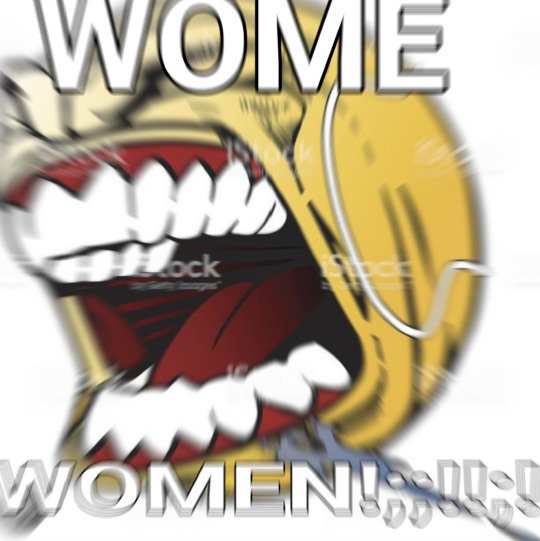
literally any of those interpretations of goromi and/or kazumi are incredible gorgeous scrumptious. i was gonna end it there but i gotta reiterate some things actually oh my god i love them so so much
i figured out i was genderfluid right before i first played kiwami so goromi literally changed my brain chemistry
like i don't think i CAN put it into words how much goromi means to me. she's incredible. what the fans have done with her is incredible. i never finished it but i was planning on making a massive post on my relationship with gender and goromi and what she means to me but i can sum it up. im gonna (numbered) list some needs and then talk about how goromi hits each one. (so like 1-4 (general) then 1-4 (goromi))
i have never encountered nor heard of a genderfluid character within canon media. not even a character that uses multiple pronouns. the closest situation to it are shapeshifters, and even then their other genders are more like disguises than "openly same person just different gender/expression", so it doesn't scratch that itch for me and i never really related to them much, nor to even the occasional fictional nonbinary person. i didn't really relate much to transmasc people and their experiences either. honestly, the stuff that grabbed me most were transfem stories, which i didn't understand because im afab (turns out im transfem AND transmasc. i know that's unconventional but you're just gonna have to trust me on it bc im not elaborating rn <3). it's not as if i don't have transmasc-typical experiences or feelings, but it's like. it's different. hell my genderfluidity doesn't even present very much like what I've seen from other ppl. what the fuck. so basically no man is an island except for me okay.
when i go into media expecting queer rep, i tend to be underwhelmed by it. im not sure why exactly, but i tend to enjoy non-canon stuff more for whatever reason, even as i yearn for actual representation. the result of this is that the rep i tend to be most affected by is stuff i stumble into on accident, canon or not, so my expectations/feelings develop more naturally. it's not an exact science, but it's there.
(i think some of the aforementioned issue also comes from the ways rep is done. like maybe they're sapphic, but they're usually both cis and gender conforming (not even gay-looking femme either, like. cishet normie style. hallmark type gay, for lack of a better term) and neurotypical, so their experiences are vastly different from mine. i just tend to latch onto them less than I'd like (i imagine this goes even more for poc because oh my god is (western) sapphic . media like. very very white). basically, i lack investment in them because they lack the texture i need to get a foothold in it)
one of the main problems i have faced as a genderfluid person is a lack of direction in regards to transition. I've never seen it talked about but there's no way for me to ever get a body i am going to be consistently satisfied with, given current technology. the best i can do is try to straddle several common gender demands and compromise between them. if i want to cut my hair, i have to live with it tomorrow, when it might give me dysphoria. if i take hormones, it'll be slow to take and slow to stop. surgery is permanent. it's not that there's no solutions, but i just. can't be the person i want to be at all given moments, or even most of them, because doing anything at all takes from something else. and so when the closest thing we have to genderfluid rep is shapeshifters, it doesn't feel like rep to me because it's a completely unattainable fantasy, and one that disregards one of the primary issues i face given my identity, one I've never seen represented
I've never seen a character that a significant amount of people headcanon as any kind of genderfluid or multigender. i don't really know that many people with such identities either. so even within fandom spaces, where queerness can be more evident/daring, it's a rare thing to see, and never reoccurs within the same character much
im not gonna lie i just really like majima in general okay. and kiwami hyped me up so hard on its queercoding so any little thing got me howling and crying and pointing vigorously.
speaking of which i FUCKING LOVED YAKUZA back then (still do <3) but i literally knew no one who played it and didn't engage with it online other than scrounging pinterest (which was rough but also shoutout to that comment on a majima post that was like "so there's this he/she 😳" you literally actually changed my life and also made me soo so much more transgender. lime it was already there but it got multiplied. thank you i would actually kiss you in real life mwah) so like any queer rep that's good or close enough is gonna rock my world. I'd already talked to rina (that sapphic hostess) and kiryu saying gay rights and her talking about her actual issues was fucking. i cried actual tears over that man it meant a lot to me. not the point rn though
okay i think that's enough. here's how goromi engages with these points
look idk what it is but goromi FUCKS gender wise. big scary gruff nasty yakuza man in the streets, absolute BABE in the sheets. she's gender nonconforming as fuck and she's. god i love her. she's so interesting, the way she's both a disguise and fully just majima for real in a way the other disguises aren't. like she puts so much more design and thought and personality into goromi's clothes when she coulda just gone to party city and grabbed Hostess #1 y'know? she's the same person, but her mannerisms change in ways i relate to. it's intentional and it's not intentional and i love her she's complicated and again gnc femininity is actually super my jam apparently so that's it that's the itch scratched. more in point 4
full disclosure i technically knew about goromi beforehand and was very prepared to fall in love with her, like heart racing clearing my schedule kinda prepared, and i wasn't disappointed. i wasn't expecting it to be like... so good, y'know? like i got my hopes up, i just was kinda also bracing for something queerphobic to happen (which can happen, but it didn't for me), and instead the encounter was really affirming and tender and wonderful and romantic and i really fucking liked it ok. maybe she wasn't supposed to be more than a gag character, i don't know. but there's a lot of genuineness in what she says and how she acts. she feels real, she makes sense like this, and im not alone in seeing that significance. and people took it and ran with it beautifully, because they found something meaningful in that (see 5)
it helps that i was already really invested in majima as a character. he has a LOT of texture and frankly this series can't write or treat its women well so like. we'll make one i guess (transes your fave). a lot of female characters (and a lot of mainstream queer ones as well) tend to be kinda sanitized in certain ways, or just don't have a lot of room for personality elements that could be divisive or non-marketable, if that makes sense. they can't be "ugly" or "annoying" or "cruel" or "gross" or "bitchy" or anything else. my favorite female characters are ones that are allowed to be weird and unpalatable!!! they're wonderful!!!! let women be shnarsty 2k23. and goromi is anything but bland <3
this one's big. goromi has to wake up tomorrow and be a patriarch. she has to keep her men in line. for all the confidence and glamor of the butterfly of the night, she's gotta take it all off tomorrow. maybe when she's not ready for it. maybe she can't do all the stuff she want to with her presentation because of her job, or because she's predominantly guypilled, or whatever. a lot of it for me comes down to her goatee. it's not just that she's gender nonconforming (though that reading is in and of itself deeply refreshing), it's also that she may face some of the limitations in expression that i do, in a way I've never seen expressed before. she has to pick and choose. is she gonna want that goatee tomorrow? is it worth it to shave it off only to feel weird without it? is it worth the time it takes to grow it back? she's no shapeshifter, and it can very well cause her problems. but she still radiates beauty and confidence, y'know? i love her :)
this one's really important too. i have never seen so many people see my (often OUR) experiences in a character like this before. she's WIDELY headcanoned as bigender, genderfluid, etc, and people love her so much. i am not alone in loving her for very gender specific reasons, and the fan content I've seen really resonates so much with me. sometimes when im down I'll just... dig through goromi content. she's a great pick me up, even when her stories aren't completely happy. the myriad ways people interpret her and her identity and how/when it came to be, the self discovery, the confidence, the insecurity, the compromise, the vulnerability!!! the GENDER. (god the outfits they put her in. stop im already dead. im so endeared to her you have no idea. but you probably do and THATS the magic, baby) i have found solace and camaraderie and belonging in people's content of/for her, and im not alone. seeing that passion and excitement is so profound to me, even more so than it usually is with art and community and fan spaces (which is already a lot). when i mentioned i was making a "what goromi means to me as a genderfluid person" post (the one that got scrapped oops lol), someone responded saying they, as a bigender person, also really loved goromi for that. it meant a lot to me to see. genderqueer readings of goromi are obviously not universal and there's for sure transphobia within the rgg fandom, but I've never seen such a large force of people united in not just a trans interpretation, but a genderqueer AND genderweird interpretation. WE THE GENDERFUCKS LOVE HER IS THE POINT
not much to say here besides: this is why marginalized rep matters in all media (rather than just designated gay zones), because seeing it grow/appear in media that means a lot to you makes you feel like you're being seen as a fan. you matter and are a part of that world. i think it especially makes sense as part of a big/long running franchise as well, as a part of adapting to a changing society and an acknowledgement of past gaps and work to correct it. it's also good to get a wide variety of voices and experience portrayed, and that's easier when more people are doing it.
related to above but this one's short but it's one thing to have a side character in an rgg game be queer and accepted, and it's another for a main character to be so queercoded, and accepted within canon, at that. i think that's part of why people care so much about how mine's lines and story are translated and depicted, as well, though that's another tangent for another time
umm other goromi points speed round
number one i have SUCH a big lllllllesbian crush on her oh my god. i love womne. two the visual art these people make of her is insane. like they UNLEASH. three the fan writing surrounding her is also so good mwah thanks y'all four i watch the goromi all answers somewhat frequently fun fact about me five if any character is getting a shrine in my house it's her. kiryu's a second. i need to see this woman all the time im not fucking around six her voice is soooo pretty to me seven why did they put her in the worst lighting in her intro. not important she serves always but that was really strange like she's pretty don't be scared of it. embrace it seven 80s goromi content drives me insane I've posted about it before but it's so fuckinf good eight t4t kazumaji is always going to be incredible and flavors where goromi exist are impeccable. same for saemaji. equality nine i love how she screeches and cackles and wears "gaudy" clothing i love how instead of trying to be the "perfect woman" she's like fuck it im gonna be myself it's like that post about that trans guy who wants to be one of those men who's house has a bunch of disassembled cars in its yard just loving the mundane and the unconventional or unconsidered elements of gender because it feels so good to explore that even if others take it for granted ten HARUKA + AUNT GOROMI CONTENT >>>>>>>!!!!!!!! eleven i love women and i love queens and i love queers uhhh i think that's most of it for now
kazumi time
i also love women. i love kazumi. i love her so so much. much like goromi there's a handful of ways to interpret her identity-wise and they're all fantastic.
something I've noticed about the series while trying to scheme up sapphic/"genderbend" (i mean it's? not the most accurate term but it's as close as i can get. "sexbend but they're cis" is i guess also it but like. they don't have to be cis? anyway) content for these characters is that a lot of the ways they live their lives and express themselves are very tied to a particular kind of masculinity. so like, take kiryu. kiryu's pretty gender conforming, and his job is to be a big strong man who protects the weak. he's expressed feeling pressure due to gendered expectations before. how would one go about an "everyone knows she's a woman + transphobia is not relevant (i.e. a cis woman kiryu or i guess just. really early transition kiryu? idk)" version of her? because she would not have these same expectations living as and being seen by the world + the yakuza as a woman, right? is she gender conforming, or gnc? is she butch or nah, i guess. and i think majima's relationship to goromi has some overlap, with like,, how he is only able to do yakuza things as a man and fun girly stuff as a woman, how she's an outlet/persona (or everyone just thinks she is).
this is to say that people seeing goromi (as she's allowed some wiggle room by being both more mischievous/deceptive and queercoded in a more feminine way) and seeing her and kiryu's dynamic and going oh bitch. it's makeover time and pulling him in is GREAT because it's fun and hrngh women sexyhot but also fascinating in regards to like,, how kiryu as a character relates to gender. I've seen a few interpretations (namely @squishylemonbubbles ) that view kazumi as a sort of way to put the sword and shield down and just... be. be taken care of, even. to be softer in ways she can't be as a man due to her environment. and i LOVE that shit. and then some people are like idk she's a bad bitch though let her have some gender too and that's ALSO GREAT. i like it when people explore her with goromi as a guide/catalyst, though i think it'd be cool to have her do things a little more independently of goromi/majima/kazumaji stuff just for the sake of it. i love her. people should draw/write about her way way way more often and maybe just exclusively from now on and i think maybe I'll be satisfied. i should do that too
bonus thought: we should do this for way more yakuza characters. you're telling me NO ONE has done saejima yet. I've never seen her. no daigo no akiyama no ichiban etc (i was gonna say nishiki but i actually HAVE seen hostess nishiki..... once... <3). c'mon. t-boy swag/drag king haruka also has a lot of potential but i think ppl never do it partially because there's no women in this series so like. endangered species
anyway im not kidding i actually was derailed for a while just going OUHOUUUGHHH I LOVE WOMEN when i first got this and it was a delight getting to answer this, thank you x (also sorry it was so long? anyway im gonna edit this and link to some of my goromi and kazumi content, of which there is too little, because i love them so so so so much. ok bye)
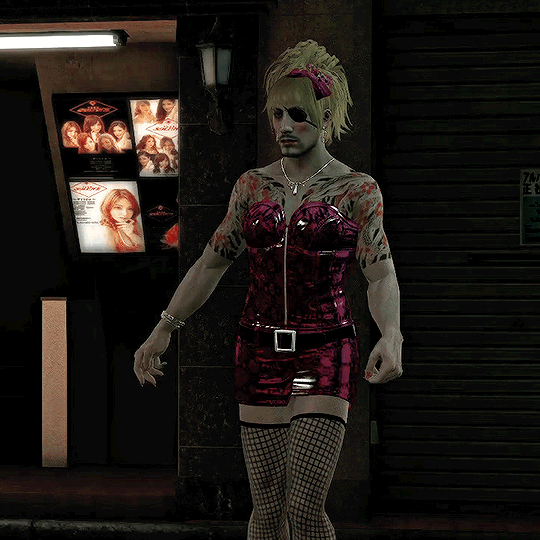
(ok here's some of my goromi and/or kazumi posts. some of them are old and im not proud of them all anymore but that's okay. they may not much but they're honest work. in approximate most recent -> least recent order)
NEW and referenced in i think the tags of this post: 80s goromi kazumaji disco meet cute (meet ugly? tbd)
misc doodles ft 80s goromi AND girlboss nishitani
goromi pink truck dialogue
squishy's kazumi design 1 (ft goromi and haruka)
squishy's kazumi design 2 (but it's just kazumaji this time)
she was a boy and he ate. worms
screaming into the void about drawing kazumi
^^similar but for goromi (actually im redrawing this atm bc i never posted it)
80s goromi text post
another goromi wip i didn't finish oops lmao
wigless goromi wigless goromi
goromi kiryu post-fight printcircle
misc goromis
aunt goromi
unfinished wip teaser i was super confident about and then never finished oops lol anyway it's more goromi
#thanks for the ask!!#i love women#rgg#ryu ga gotoku#kazumi#goromi#i didnt really edit this so i hope it makes sense sorry#just remembered i got distracted redrawing some old doodles of goromi earlier. effervescent timing#ok i think im done for now. might come back to add other ppl's life changing cream of the goromi crop content but i gtg to bed#honk shoo honk shoo and all that
18 notes
·
View notes
Text
Radio Silence book review
Radio Silence by Alice Oseman is about Frances Janvier, a secondary school student whose entire life revolves around school. She is head girl, she is clever, she gets good grades, her life goal is to attend the University of Cambridge and study English Literature. This is the hand life has dealt her, and she has grown to accept it. She has divided herself into two parts: School Frances, and real Frances. Her school friends think of her as boring and book obsessed, and she does not have any friends who get to know who she truly is. Who she truly is, is a nerdy artist obsessed with an underground podcast called Universe City. When she is not studying, she is listening to old and new episodes of Universe City or drawing fanart that she posts to her Tumblr blog.
One night, at a club neither of them want to be at, she runs into Aled Last. Aled is the boy who lives across the street from her, the one she has never truly met but has always been there fading into the background. He is the twin brother of Carys Last, the girl who ran away from home and used to be Frances’ best friend. Aled drunkenly confesses that he is the Creator of Universe City. The stars seem to align as he and Frances become best friends and begin working on the show together, with Aled as the Creator and voice of the main character ‘Radio’, and Frances voicing his sidekick ‘Toulouse’, as well as making art for the show. But the struggles of adulthood catch up to them, and they must learn to navigate the building pressure of school as they both prepare to go off to university, questioning if it is something either of them actually wants. They must fight to find their way to stability as they lose touch with each other and their friends, as Aled��s mother is revealed to be more than her carefully built public persona, and finding Carys Last becomes more urgent than ever.
The struggles in this story are very realistically represented, whether it be coming of age drama, relationships, or teenage interaction, Oseman nails it. The pressure of education is a main focus, giving a voice to teenagers who feel as though their entire lives have to revolve around their grades and education, or else they are failures to society. Being a student myself, I know that many of my peers feel, or have felt at some point in their lives, that their self worth is inherently tied to their academic performance. This stress escalates to students being driven to sleep deprivation and severe burnout, sacrificing their social, emotional, and physical health to make sure their performance does not falter. It is a toxic system, one that is often overlooked because of education being seen as a privilege. Students are taught that they are not allowed to question it, or else they are disrespectful and entitled. In Radio Silence, Aled’s mother is an accurate portrayal of an abusive parent who does so in a way that is entirely unassuming to the outside world. Abuse can often be hidden under the guise of being dedicated to the education and success of a child, the way Oseman portrays that in this story helps draw attention to the very real and negative impact it has on teenagers.
Oseman also makes sure to include POC and queer representation in her stories in a realistic manner. It is refreshing to see these characters portrayed without their identities and social struggles being the main plot point of a story. Too often are minority characters used to make some radical statement about being an outcast, or to tell a Love, Simon-esque story about a ‘normal’ (white cisgender heterosexual appearing) kid who is secretly gay, in an attempt to make queer people and their identities palatable to cishet society. Three out of five of the main cast in Radio Silence are not white, a majority of them are not straight, and their identities are not treated as a radical exception, or some revolutionary social statement. Frances is mixed, and laments the fact that she is not more connected to the paternal side of her family and her Ethiopian heritage. Oseman does not make Frances a spectacle, but instead humanizes her and makes sure to highlight the importance of her POC identity to who she is as an individual.
This representation is important to see in Young Adult novels because it lets readers know that they are not alone in their identities and struggles, it gives them a safe place to feel seen and heard on a scale larger than themselves. I tend to be dubious of authors who write modern day YA fiction because it tends to feel strained, like they do not quite understand how ‘kids these days’ truly behave and interact with the world around them. References to popular media feel out of place, like a desperate grab for approval from the teenagers who they are marketed towards. Oseman’s content is clearly marketed towards teenagers, but the stories she tells are not out of touch. She writes from the perspective of someone who is familiar with that life, telling stories for her audience and narrating their lives and struggles back to them. Radio Silence has some of the most realistic representations of internet culture that I have ever read. It portrays the toxicity of online spaces and fandom culture, showing fans blatantly disrespecting privacy and boundaries when it comes to the content creators they like, mass amounts of hate and death threats sent unabashedly, because over the internet everything feels impersonal and people lose a sense of filtration. One of the made up Tumblr usernames Oseman uses as a throwaway in this book is ‘troylerphandoms23756’, which is exactly the kind of thing you would have seen on Tumblr in 2014, the year the story takes place. This is one of the many tiny details that make it clear to me that she is immersed in what she is talking about, and is familiar with the intricacies of teenage experience that many authors lack.
Oseman often has the same characters appear across multiple pieces of their work, weaving their stories together into the same universe. Aled is one of the two main characters in Radio Silence, as well as appearing in their ongoing Webtoon, Heartstopper. There are also references to other Heartstopper and Loveless characters in Radio Silence, and vice versa. Despite reusing characters and generally having the same tone and setting, their books never feel as though they have started going in circles, nor have they become stagnant. Each story is unique and interesting, and the same characters being present across their media creates a more detailed and immersive universe. Along with them being immersive, their books are very easy to read. Not to say that they are simple, but that Oseman has a way of storytelling that keeps you intrigued throughout the entire book, compelling you to keep turning to the next page. In Radio Silence, Frances narrates the story from the perspective of already having lived it, making cryptic comments that allude to a larger drama or plot point further on in the story. This makes you question why she feels the way she does, and what sort of epic drama is coming, the storytelling sinking hooks into your brain and dragging you along for the ride.
Something to be appreciated is how Alice Oseman actively decenters romance from her stories. There is a romantic subplot in Radio Silence, and it is written very well with realistic problems and communication. But it is also made very clear that the main characters are not romantically interested in each other and do not fall in love, as would be the traditional expectation of a story like this. A line from the chapter ‘Something Before We Continue’, that is also printed on the cover of the book, very clearly states, ‘You probably think that Aled Last and I are going to fall in love or something. Since he is a boy and I am a girl. I just wanted to say- We don’t.’ I enjoy reading romance in fiction, but it gets exhausting when every single story feels as though it must center romance, or have it as the idealized end goal. It sets a precedent for how people are expected to live their lives, and teaches that romantic relationships are somehow more enriching and important than other kinds. It is refreshing to see that expectation so firmly denied and flipped on its head, Oseman subverting it by showing that close friendships are just as important as romance.
Alice Oseman is only 27 years old as of writing this and has already published multiple well written books, as well as maintaining their Webtoon Heartstopper. The first chapter of Heartstopper was posted in 2016, and in 2022 it is being published as graphic novels, as well as being adapted into a Netflix series. I have read all that is currently posted of Heartstopper, their book Loveless, and now Radio Silence, and I have never been disappointed by their storytelling. Radio Silence evoked genuine emotion from me on multiple occasions, which is not praise I can give very often. It made me angry, it made me cry, and at the end when everything came together, it made me cheer out loud for joy. The conclusion was so satisfying after the emotional attachment it had cultivated. In summary, Alice Oseman continuously amazes me with their writing, especially when it comes to her characters and representation of realistic relationships and teenage struggles. I am excited to see where she goes from here as she will inevitably improve with more practice and experience.
#radio silence#alice oseman#osemanverse#aled last#frances janvier#universe city#carys last#loveless#heartstopper#book review#long post#writing#bookblr#library#books#literature#english major#dark academia#chaotic academia#academia#abuse ment tw#book report#first post#new blog#school#education#fandom#literature analysis#opinion writing#the pendragon library
49 notes
·
View notes
Text
The Queercoding of Pinky and the Brain
This originally was just me infodumping to my friends on discord, but I decided it might be interesting to some people on here, so I polished it up and made it an actual essay lmao
To start, we’re going to break this into 2 sections -- the relationship between the mice, and Pinky’s relationship with gender, because queercoding doesn’t just mean gay!
For a 90′s show, Pinky and the Brain (and its mother show, Animaniacs) was very progressive for its time! But there were still lots of things that they couldn’t slip by censors, and thus, that’s where we have to read between the lines. And that is something I wanted to clarify here before we dive in, the actual meaning of queercoding. It’s NOT the same as queerbaiting. Queerbaiting is when the people producing certain media purposefully dangle the possibility of queer representation to lure in audiences (most prominent examples are BBC Sherlock, Riverdale, and Supernatural I GUESS? who knows abt that last one anymore), but never follow through, purely for profit. Queercoding is when media producers WANT to write in queer representation, but can’t, usually because the censors won’t let them. So, they must resort to subtext. (example: the policemen from Gravity Falls) It could also be unintentional, simply assigning certain characteristics associated with the LGBT community to characters. (example: Bugs Bunny, many Disney villains) Either way, it heavily relies on the audience picking up subtext, but whether it’s malicious or not varies, depending on the media. Bugs Bunny is an example of positive accidental queercoding, while a lot of Disney villains are negative examples.
Now, to actually discuss the gay little mice! Pinky and the Brain, whether it be intentional or not (based off comments from Maurice LaMarche, Rob Paulsen, and Tom Ruegger, signs strongly point to intentional, but it’s never been explicitly confirmed), is an example of positive queercoding.
There are many moments that I could pick out to discuss here, but we’ll start with some VERY on the nose gay metaphors.
Remember Romy? If you don’t, that’s their actual biological son! Romy came about due to a cloning accident, where their DNA got combined and spat him out.
There’s SO many things I could say about Romy. Every appearance he makes has an overarching gay metaphor as the plot. His first appearance in the episode Brinky (yeah it’s literally titled their ship name), it deals with his dads (WHICH I ALSO WANT TO POINT OUT, he DOES call them both dad, and they do both call him their son) disapproving of the fact that he wants to leave home and not follow in their footsteps of taking over the world. Brain even goes as far as disowning him whenever he tells him, which is certainly something a lot of queer people can unfortunately relate to. Also seen a lot in this episode is Pinky and Brain arguing even more than a married couple than usual, which pushes Romy away even further. Later, when Romy eventually does leave, and Brain starts to regret chasing him away, he tries desperately to reach out to him, but Romy doesn’t want anything to do with him. They end up tracking him down to an apartment building, where Romy is now living with his human girlfriend. When questioned about their relationship, the girlfriend, named Bunny, goes off on a tangent about how people shouldn’t judge others based on labels or relationships (hello?), and that Brain needs to be more tolerant. Brain apologizes and Romy forgives him. Happy ending.
Romy’s only other appearance is in the comics. Essentially, the plot of this one is that Brain wants to become the president of the local high school’s PTA, but he needs Romy’s help to make it look like he has a normal home life. He also enlists the help of Billie, the obligatory Woman introduced to make sure Brain doesn’t look as gay as he actually is, that he has a crush on. She pretends to be his girlfriend, and Pinky pretends to be Romy’s uncle, while they make up the story that Romy’s actual mother was lost at sea. Because if the organization found out that Brain has a son with a MAN??? THINK of the controversy! Anyway, the plan works, and Brain actually manages to get elected as president. Throughout this though, Pinky gets WEIRDLY jealous that Brain keeps brushing him aside for Billie. To the point where during Brain’s inauguration, Pinky actually dresses up as the wife/mother lost at sea and storms into the room.
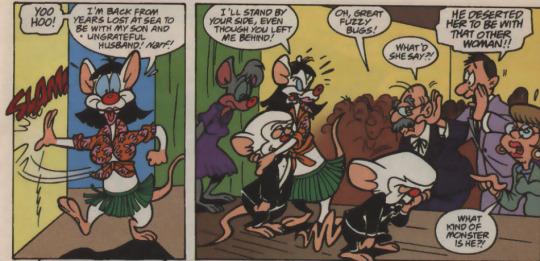
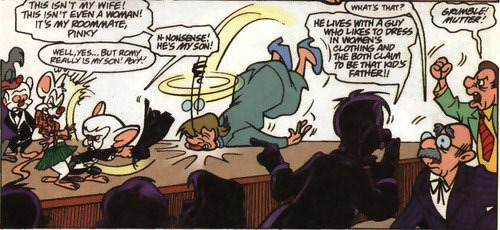
[ID: Comic panels of Pinky, Brain, and Romy on stage at the inauguration ceremony. Pinky busts into room wearing drag, saying, “Yoo hoo! I’m back from years lost at sea to be with my son and ungrateful husband! Narf!” He then hugs Romy, while glaring at Brain. He goes on to say, “I’ll stand by your side, even though you left me behind!” The people in the audience begin to question this, saying, “Oh great fuzzy bangs!”, “What’d she say?!”, “He deserted her to be with that other woman!”, “What kind of monster is he?!”. Brain then rips off Pinky’s wig and says, “This isn’t my wife! This isn’t even a woman! It’s my roommate, Pinky.” Pinky replies, “Well, yes... But Romy really is my son! Poit!” And Brain responds, “N-Nonsense! He’s my son!” More people in the audience angrily speak up, saying, “What’s that?”, “He lives with a guy who likes to dress up in women’s clothing and the both claim to be that kid’s father!”, “Grumble! Mutter!” /END ID]
Needless to say, this doesn’t end well for them. What we can conclude from this is that homophobia exists in the Pinky and the Brain universe, and our characters are directly affected by it.
Moving on, And-There-Was-Only-One-Bed is a pretty common occurrence with these two. Their cage is big, they have plenty of room for two beds, but? They choose to sleep together? Even in some times where this has been inconsistent and they DO have separate beds, they’re always RIGHT next to each other. (what if we put our minecraft beds together ❤😳)
I would like to mention the episode, You’ll Never Eat Food Pellets In This Town Again! This episode is interesting to say the least. Deals with a lot of the meta of the show. Anyway. In this episode, Brain has a nightmare that he’s in a loveless marriage with Billie. You know, the woman he’s supposed to have a crush on. In the end, he wakes up from the nightmare in the same bed as Pinky.
Speaking of female love interests, Pinky is seen having multiple relationships with characters of different species. Any time this is brought up by Brain, Pinky counters with Brain being too intolerant. An honorable mention with this is in Wakko’s Wish, when Pinky is with Pharfignewton, and Brain’s constant pestering about their relationship could be read as jealousy. Pinky needs a mousy date, after all!
Something else I would like to mention is in one episode (I forget what it’s called, I’ll try to look it up later and edit this), Brain is applying for a job. The employer asks Brain if he’s married, and Brain hesitates before saying he “has a roommate,” but that he’s occupied with his own things, which then cuts to a shot of Pinky applying lipstick.
Leading into part two of this essay, Pinky’s relationship with gender! Pinky has always been very gender nonconforming, and loves to wear dresses, do his makeup, and make himself look pretty. For the most part, this is played pretty straight, and not as a gag, like a lot of shows tend to do! It’s just a casual fact about him that he likes to present femininely sometimes.
This does play into their taking over the world plans pretty often, where Pinky wears drag, usually either to sneak into somewhere. Like in one of their earliest appearances on Animaniacs, Noah’s Lark, where they pose as a couple to board Noah’s, and I quote, “love boat.” After boarding, Noah says to himself, “Who am I to judge?” Okay. Yeah. Alright. Anyway.
I actually had less to say on this than I thought I did, but I wanted to make sure to emphasize that Pinky at the very least is coded as being Not Quite Cis, and that he’s played a key part in helping a lot of people watching the show figure out that they’re also Not Quite Cis.
Wrapping this up because I’m hungry, but I want to throw in some more honorable mentions that I really do not see any type of cishet explanations for:
They literally go on a romantic date at a very fancy restaurant in Brain’s Night Off. This is played extremely casually, and the only remark from anyone that they receive is that they are “much smaller than the usual clients.”
Pinky, on at least one occasion, daydreams about him and Brain being a married couple, and wanting to be a housewife (the original malewife ❤)
There’s an issue in the comics where Pinky has a crush on another male mouse, and when Brain gets annoyed, Pinky reassures him that he thinks Brain is cute and quite the catch too
Brain attempting to kiss Pinky in the reboot??????
Brain actually did conquer the world once in the Halloween special, because Pinky made a deal with the devil for it, and thus Pinky got sent to hell! Brain actually went to hell and gave up the world to bring him back
Brain was extremely close to conquering the world once more in the Christmas special, but after reading what Pinky’s feelings for him were (nothing romantic, just Pinky basically just praising Brain for being so hardworking and an amazing mouse, and lamenting that he never gets anything for it), he gets so emotional that he sabotages himself and wishes everyone a Merry Christmas instead
TLDR; these mice are very queer and need therapy, and are probably the most heavily queercoded characters that I can think of in children’s media.
573 notes
·
View notes
Note
This question has probably been asked many times but how do lesbians find other people? I tried tinder and it's so useless, in general girls disappear even if you have chemistry or just don't answer. I don't know if it's cultural, I live in Italy and I noticed usually foreigners are the ones that engages the most. It's not just a me thing, I've asked other queer friends and they said that it was the same for them. I tried both in my unitown and my hometown, my hometown is in the south and it's even worse, I passed from having matches but no conversations to almost zero matches. I genuinely think I'll never find someone, especially now that I think I'm going to quit uni and come back home. People seem to appear only for the pride parade and when it finishes I guess they just disappear under water. I read other apps' reviews and their even worse than tinder...
Finding somebody can be difficult for anyone, and this problem is more prevalent among queer people as our dating pools are generally smaller (due to both actual number of available people, as well as prejudice againse for example bisexual people both within the community, and transphobia) and also tend to be "invissible" - you can't really tell by the way somebody looks that they're queer. Like sure, there are some signs of being queer, like fashion and the words you use, but you never know if somebody is just a gnc/alternative cishet or if somebody is trans, regardless of what some transphobs may claim.
I've found partners both online and through "old-fshioned" ways. Ofc online dating isn't suitable for everybody. For example, I who am demiromantic have never found a romantic partner online, but I have found sexual ones. For a trans person, it may be safter to online-date so they can be upfront about their transness and not risk a potentally dangerous confrontation later on.
There isn't really one way to find a partner, but the frustration when you want one sure is annoying! My advice would be to try and get an irl-meeting with somebody you've met online as soon as you feel comfortable with. Online connections are harder to maintain than those made with people you've met face-to-face. I'd also suggest that if you belong to any social groups you're out in, be open about looking for a partner. And put effort into your non-romantic or non-sexual friendships. Relationships are important, including those with our friends.
Nurturing friendships don't only make us happier, more well-rounded people, it makes us into better partners when we do find some other type of relationship, be that romantic or QPR, and gives us a security network is a significant relationship turns sour. Oh and being liked makes us look more attractive in the eyes of potential partners!
-mod liz
13 notes
·
View notes
Note
You know, one thing that pisses me off about the Liam "queerbait" crowd is that like... In C1 the problem was that the relationship was explicitly canon but not endgame. In C2 the problem is the relationship is endgame but not explicitly canon enough (in game anyway). What do these people think Liam and Matt aren't willing to do? Have a clearly canon mlm romance? Cause that happened last campaign. Have an endgame mlm romance? That happened this campaign. It just has to be everything or else it's not enough, who cares if the resolution makes sense for the characters, am I right? Who cares if both parties have always been extremely guarded and kept things vague and ambiguous? If they don't kiss at the end and start dating immediately then it was all for nothing. It's like all the romance and meaningful time spend together up until the very end, canon Shadowgast or not, means literally nothing to some people. If it isn't exactly the type of classic romance you want then it doesn't count? People just aren't as willing to be open to different kinds of relationships for queer people as they are for cishet ships and it makes me sad. It's more important for there to be a mlm relationship (to the exact measure you wanted) than for it to be natural and make sense. And somehow they're the same people who talk about rep points. Doing it for rep points, to me, would've applied more to sacrificing the characters' personalities and still ongoing development to be able to say "look, they kissed and are dating! We have a mlm romance on the show!" than what actually happened.
This is already a show full of rep everywhere, of all kinds, handled with care and respect. If it's not someone's kind of rep, fine. If you need flashier, more explicit, clearer, absolutely fine. But this isn't a show for general audiences that's airing on television. The cast don't have a moral responsibility to rep anything explicitly (or at all for that matter. They never even promised Shadowgast would happen, and if it hadn't that would've been well within their right), to normalize anything for the audience. This is a webseries for adults, played by people with their personal issues, interests and needs they're working through, through these very personal characters, that people decided to watch and I would expect them to be able to accept and respect the subtler representation even if it isn't what they personally needed or wanted. But alas, it seems some people can't do that.
Sorry to bring more disk horse to your askbox, you don't need to answer this if you don't want to of course. I just felt like venting cause Shadowgast is my otp since I laid my eyes on them and I never wanted them to get together right away at the end. And I knew that this would be the response when it inevitably happened that way, cause that's how these two characters have always been built, since their very first appearances.
Don't apologize, this is .. basically every Thought I've had as well, but written down more precisely than I can right now <3 I don't even have much more to add. Just,,, T H I S. So much this. And, I hope its okay that I did publish because so much of what you said is so on point!
Especially this: "This is a webseries for adults, played by people with their personal issues, interests and needs they're working through, through these very personal characters, that people decided to watch and I would expect them to be able to accept and respect the subtler representation even if it isn't what they personally needed or wanted"
50 notes
·
View notes
Text
Why Cap Being Internally Closeted Is Not Only Possible, But Valid Representation
i wrote this to a lot of mitski and onsind, so you can’t blame me for any feelings that bleed through
now i don’t know if it actually exists, but i’ve heard of there being a lot of discourse surrounding the captains story arc regarding his sexuality- i believe the general gist is that having a queer character that remains closeted to themselves is either unrealistic or ‘bad’ representation, and as someone who really treasures the captain and relates to his story so far a lot, i thought i might break this down a bit.
i’ve divded up every complaint i’ve heard about this into four main questions which i’ll be covering below the ‘keep reading’, because this is gonna be pretty comprehensive. full disclaimer i reference my experiences as an ex-evangelical non binary butch lesbian a couple times, and i spent a year studying repression and the psychological impacts of high demand sexual ethics for my graduating sociology paper, so this is coming with some background to it i swear
the big questions:
can you EVEN be gay and not know it????
but isn't this just ANOTHER coming out arc, and aren't we supposed to be moving beyond those?
but if cap can't have a relationship with a man because he's a ghost, what's the point?
since cap's dead, isn't this technically bury your gays, and isn't that bad?
1. "but is it really possible to not know? Isn't that bad representation?"
short answer: no and no.
before i get into the validity of the captain's ignorance about his own orientation as 21st century rep, let's break down how the hell the captain can be so clearly attracted to men and still not even consider the possibility that he might be gay, as brought to you by someone who literally experienced this shit.
the captain's particular situation is both a direct result of the lack of information around human sexuality he would have had (aka clear messaging that it's actually possible for him to be attracted to men. i don't mean acceptable or allowed, i mean physically capable of happening- the idea that orientations other than heterosexual exist and are available to him, a man), and a subconscious survival mechanism. the environment in which he lives is outright hostile to gay people, while the military man identity he has constructed for himself doesn't allow for any form of deviation from societal norms, let alone one so base level and major. as a result of this killer combo of information and environment, instincts take over and the mind does it's best to repress the ‘deviant’ feelings until a. one of these two things changes, or b. the act of repression becomes so destructive and/or exhuasting that it becomes impossible to maintain. the key to maintaining a long-term state of repression of desire is diverting that energy elsewhere, and a high-demand group such as the military is the perfect place for the captain to do this (this technqiue is frequented by religions and extremist ideologies worldwide, but that’s not really what we’re here to focus on).
while the brain is actively repressing ‘deviant’ feelings (aka gay shit), this doesn't mean you don't experience the feelings at all. when performed as a subconscious act of survival, the aim of repression is to minimise/transform the feelings into a state where they can no longer cause immediate danger, and something as big as sexual/romantic orientation is going to keep popping up, but as long as the individual in question never understands what they’re feeling, they’ll be able to continue relatively undisturbed. you know how in heist movies, the leader of the group will only tell each team member part of the plan so they can’t screw things up for everyone else if they get caught? it’s kind of like that.
this is how the captain appears to have operated in life AND in death, and it’s a relatively common experience for lgbtq people who’ve grown up in similar circumstances (aka with a lack of information and in an unfriendly-to-hostile environment), and accounts for how some people can even go on to get married and have children before realising that they’re gay and/or trans.
personally, while i can now identify what were strong homo crushes all the way back to childhood, at the time i genuinely had no idea. there was the underlying sense that i probably shouldn't tell people how attached i was to these girls because i would seem weird, and that my feelings were stronger than the ones other people used to describe friendships, but like-like them in the way that other girls like-liked boys? no way! actually scratch that, it wasn't even a no way, because i had no idea that i even could. i even had my own havers, at least in terms of the emotional hold and devotion she got from me, except she treated me way less well than cap’s beau. snatches of the existence of lgbt people made it through the cone of silence, i definitely heard the words gay and lesbian, but my levels of informations mirrored those that the captain would have had: virtually none, beyond the idea that these words exist, some people are them, and that's not something that we support or think is okay, so let's just not speak about it. despite only attending religious schools for the first couple years of primary, until i got my own technology and social media accounts to explore lgbtq content on my own- option a out of the two catalysts for change- the possibility of me being gay was not at all on my radar. don’t even get me started on how long it took me to explore butchness and my overall gender, two things which now feel glaringly obvious.
when shit starts to break down, you can also make the conscious choice to repress which can delay the eventual smashing down of the mental closet door for a time (essentially when the closet door starts to open, you just say ‘no thanks’ and shut it again by pointedly Not Thinking About It). in the abscence of identifying yourself by your attractions, it becomes quite common to identify with a lack- in my case, this meant becoming proud of how sensible and not boy crazy i was, and in the captain’s case, this means becoming proud of how sensible and not sensuous/wild (aka woman crazy) he was, identifying with his LACK of desire for women and partying (which, even in the 40s, involved the expectation of opposite sex romances and hook ups). i’m not saying that’s the only reason he’s a rule follower, but i think the contrast between About Last Night and Perfect Day pretty much support this. (the captain getting on his high horse about general party antics that he inherently felt excluded from because of underlying awareness of his difference & his tendency to project his regimented expectations of himself onto others, vs. joining in the reception party, awareness of how the environment supports difference in the form of clare and sam, and relaxing his own rules by dancing with men- the captain doesn’t mind a party when feels like he has a place there.)
so the captain was operating in a high demand, highly regulated environment (primarily the military, but also early 20th century England itself), with regimented roles, rules, and expectations. working on the assumption that he wouldn't have had out/disclosing lgbt friends, he would have had little to no exposure to lgbt identities, and what information he did receive would have been hushed and negatively geared. while my world started to open up when i started high school was allowed to have my own phone + instagram account, resulting in me realising something wasn't quite 'right' within a few years (making me a relatively early realiser compared to those who don't come out to themselves until adulthood), in life the captain never had that experience. he didn't receive the information he needed, his environment didn't grow less hostile. with the near-exception of havers related heartbreak, his well disciplined and lifelong method of repression never became destructive/exhaustive enough to permanently override the danger signals in his mind and allow him to put his feelings into words. neither of the most common catalysts for change happened for him, so he continued as usual, even after his death.
BUT, and here’s where we come to why this is actually great representation, arrival of mike and Alison represents the opening up of new world. for the first time, the captain is actively made aware of the fact that his environment is no longer hostile, and better than that, it’s affirming. he’s also getting access to positively geared information about lgbtq people and identities, so option a of the two catalysts for change is absolutely present, and resoundingly positive.
the captain’s arc is also relatively unique as it acknowledges the oppressive nature of his environment, but actually focuses on the internal consequences, and the way that systems like those that the captain lived in succeed because they turn us into our own oppressors. for whatever reason, we repress ourseslves, and often can’t help it, and i find that the significance of the journey to overcome that is often overlooked in more mainstream queer media. perhaps it’s just not very cinematic, or it remains too confronting for cishet audiences, but ghosts manages to touch on it with a lovely amount of humour and hope. Jamie Babbit’s But I’m A Cheerleader is another favourite piece of queer media for the same reasons.
not only does it show this, but as the captain continues to get gayer and lean into some of his less conventional traits (like an interest in fashion and the wedding planning), it shows lgbt people who have been or are going through this that there CAN be a positive outcome. it takes a lot to unlearn all the things that have painted you as wrong, especially when a massive institution is desperate to continue doing so, but you can do it, you can be happy, and it's never too late. (i've been meaning to say that last point for ages for ages, but a mutual beat me to it here)
2. not just another coming out arc
i absolutely support the demand for queer stories that don’t center around coming out (it’s like shrodinger’s queer: if you’re not coming out on screen, do you really even exist?), but i don’t align with the criticisms that the captain should already be out. for the reasons mentioned above, the captain’s particular story is fairly different to the ‘young white teenager who mostly knows gay is fine, it’s just everyone else that’s got the problem, but have a unremarkably straight sounding soundtrack, a trauma porn romance, and a cishet saviour’ that we keep seeing. the captain’s ongoing journey with his sexuality emphasises the overaching theme of the show: recovering from trauma and humanity’s endless capacity for growth, and i think that’s worth showing over and over again until it stops being true.
additionally, while the captain’s journey regarding his gayness is a big part of his character and story, ghosts makes it clear that it’s not the ONLY part, and being gay is far from his ONLY characteristic or dramatic/comedic engine. the fact that i’m even having to congratulate ghosts for doing that really shows how much film and television is struggling huh.
while all queer media is, and should be, subject to criticism, i think if it helps even one person then it absolutely deserves to exist, and i can say i’ve found the captain’s journey to be the lgbt story i’ve found that’s closest to my own, which says a lot considering he’s a dead world war 2 soldier who hangs out with other ghosts including a slutty Tory, a georgian noblewoman, and a literal caveman.
3. if captain gay, why he no have boyfriend????
another complaint that’s been circulating is that since the captain doesn’t, and likely won’t, have a boyfriend, that makes him Bad Representation because it follows the sad single gay trope. i kind of get the logic from this one, and a lot of it is up to personal interpretation, but part of me really enjoys the fact that the captain’s journey towards accepting himself is separated from having a relationship.
coming out is often paired with having romantic/sexual relationships (either as the reason or reward for doing so). my own struggle with repression didn't end the second that came out, and i still struggle with letting myself develop & acknowledge romantic feelings as a result of actively shutting them (and most other feelings in general) down for years, and statistics show that lgbtq youth in particular tend not to live out their 'teen years' until their twenties. by not giving cap a relationship straight away, ghosts separates the act of claiming identity and sexual orientation from finding a partner (two things which are, more often than not, separate), and also provides some very nice validation to folks who have yet to have the relationship they want, especially when lots of mainstream queer media is now jumping on the cishet media bandwagon of acting as if every person loses their virginity and has a life defining relationship at sixteen. it’s essentially a continuation of the earlier theme of “it’s never too late”, and who’s to say the captain won’t get a gay bear ghost boyfriend to go haunt nazis with??? people die all the time, it could happen.
(also, i think him and julian will have definitely shagged at least once. it was a low moment for both of them and they refuse to speak of it.)
lots of asexual/ace spectrum fans have come out to say how much they’ve loved being able to headcanon cap as ace, and while that’s not a headcanon i personally have, i think it’s brilliant that ace fans feel seen by his character- we’re all in this soup together babey (and sorry for cursing everyone still reading this with that cap/julian headcanon. i’m just a vessel)
4. “okay, but cap’s a GHOST- doesn’t that make this Bury Your Gays?”
this is a bit of a complex one, but i’m going to say no as a result of the following break down.
Bury Your Gays (BYG), aka the trope where lgbtq characters are consistently killed off (and often with a heavy dose of trauma, while cishet characters survive) is probably one of my least favourite lgbt media tropes. BYG has two main points:
1. the lgbt character is killed, thus removing them from story entirely- hence the use of the phrase ‘killed OFF’ (killed off of the show/film)
2. the character’s death reinforces the perception that lgbtq people’s lives must end in tragedy, instead of being long and fulfilling, or are inherently less valuable. bonus points if the character is killed in a hate crime or confesses same-gender love right before they die (that one implies that queer love genuinely has no future!)
not every death of an lgbtq character is bury your gays, and i personally feel that the captain is an example of an lgbt death that isn’t.
first of all, while the captain is dead, so are the vast majority of characters in ghosts. the premise of the show means that death is not the end of the line for its characters- for most of them, it’s the only reason we get to see them on screen at all. as such, the captain being dead doesn’t remove him from the story, so point one is irrelevant.
at the time of posting, we don’t know how or why the captain died, but we've had nothing to suggest his death was in any way related to his latent sexuality, so his mysterious death doesn’t actively play into the supposedly inherent tragedy of queer lives, nor the supposedly lesser value. that’s as of right now- since we don’t know the circumstances of his death it’s a little tough to analyse properly. while the captain’s life absolutely features missed opportunities and it’s fair share of tragedy, hope and growth (which seems to be the theme of this post) abounds in equal measure. the captain may not be alive, but we DO get to see him growing and having a relatively happy existence, that for the most part seems to be getting even better as he learns to open up and be himself unapologetically- that doesn’t feel like BYG to me.
while writng this, it’s just occured to me that death really is a second chance for most of the ghosts, especially with the introduction of alison. from mary learning to read, to thomas finding modern music, they’ve all been given the chance explore things they never could have while they were alive, and hopefully grow enough to one day be sucked off move on.
in conclusion,
i love the captain very much and i hope his arc lives up to the standards it’s set so far. i don’t know where to put this in this post, but i’d alo like to say i LOVE how in Perfect Day, the captain wasn’t used as an educational experienced for fanny at all. i am very tired of people expecting me to be the walking talking homophobe educator and rehabilitator, so the fact that it’s alison and the other ghosts that call fanny out while the captain just gets to have fun with the wedding organisation made me very happy.
here’s a few other cap posts that i’ve done:
the captain’s arc if adam and the film crew stayed
a possible cap coming out
the captain backstory headcanon
if you’ve read this far,
thank you!
also check out @alex-ghosts-corner , this post inspired me very much to write this
#i subluxed all my fingers and wrists doing this but worth it#bbc ghosts#bbc ghosts headcanon#bbc ghosts analysis#the captain#caphavers#the captain x havers#ben willbond#lgbt representation#lgbt rep#queer media#lgbt media
206 notes
·
View notes
Text
CW below for a discussion that relates to homophobia, transphobia, queerphobia, acephobia, and related subjects. no specific stories, the themes just generally appear. i hope i didn't screw up and will fix it if i did.
so i was thinking about what makes Aziraphale and Crowley resonate as a queer love story, not just a "forbidden romance" (a trope that can be painfully cishet when it wants to be, which is often).
and i mean, obviously. there are a LOT of things. a lot. but something that didn't occur to me before is their relationship to each other relative to their sides.
at first, one would assume that they aren't supposed to be talking at all. this is probably true on a surface level. like, it's probably considered uncool to be caught chatting with The Enemy.
however, we do see that it's kind of normal for angels and demons to talk with a degree of civility. they don't trust each other deeply, that much is really obvious (Beelzebub says as much to Michael), and they do probably plan to kill each other eventually. at least, i think they genuinely believe that's how it's going to play out.
but! the front entrance to Heaven is in the same building as the front entrance to Hell! Aziraphale and Crowley literally walk into the building side by side! i know it's a funny joke, but Heaven and Hell aren't framed as stupid enough, by the end of the series, for that to be pure incompetence.
Michael has been in contact with Ligur for who-knows-how-long, feeding him information and presumably being fed information in return. Gabriel is entirely capable of speaking amicably with Beelzebub once it looks like their Plan isn't going through. and, of course, the Sides easily collaborate to punish Aziraphale and Crowley.
it's obviously normal for angels and demons to have a civil relationship of some sort.
a number of references are also made to the ways that the Sides are ultimately the same. Beelzebub and Gabriel are operating out of the same rulebook, after all; they both think the War is "written," they just differ on who's bound to win. to them, the most important thing is not even to thwart the other side on Earth - it's to get to the part where they're at war. they will absolutely collaborate with each other to reach that goal. they consider themselves part of the same Plan. consider even Crowley's thoughts in the book about how demons have "an unpopular job" but are "essential" to the running of the universe. they may be culturally different, but they all know they belong to the same society.
therefore, merely talking together is probably not strictly forbidden for Aziraphale and Crowley. even being sort of friendly probably isn't strictly forbidden. again, uncool? yeah. deadly? i doubt it, to be honest. heck, to their bosses' faces, they could use it as an excuse to spy on each other whether any actual spying got done.
what's the real problem? the thing everyone's upset about? it's not just that don't kill each other on sight. the real problem is that they prioritized each other. they got too intimate. their desires for a life together challenged the status quo, and even though they weren't the ones who were finally responsible for stopping the war altogether (that was Adam), they were blamed and sadistically punished for trying to preserve their relationship and their lives here on Earth instead of "growing up" and fulfilling their predetermined roles in Heaven and Hell.
in real life, society punishes people for prioritizing friendships in a way that most people assume is to be reserved only for romantic and sexual relationships. Heaven and Hell punish people for prioritizing friendship in a way that most people assume is to be reserved only for the glory of their cause.
and irl, when people are romantic or sexual (viewed as too intimate) with someone who is considered the "wrong gender," we punish them again for that. cisheteropatriarchal culture tends to expect men in particular to be not too intimate with each other and fuels a total hiding of emotion between them, although goodness knows women get pitted against each other and are expected to choose men over each other, too. also, the status quo does not know how to handle nonbinary people at all; the status quo gets angry if you even try to acknowledge that they exist. but if there was a widely-popular etiquette structure established for enbies, i'd be willing to bet it would also be a weird rivalry thing.
like, each gender sort of gets treated as "we all think the same in this gender, which is why we get along, but we don't like each other too much, because that would be gay."
"we're all looking to keep the Great Plan in motion, but we don't like each other too much, because then we wouldn't be on opposite sides."
basically, Aziraphale and Crowley read as a queer love story because their affection for each other and the lives they've created together challenges the traditional roles their shared society forces on them. it's a happy queer love story because not only do they manage to choose that affection over the status quo, they succeed and go on to enjoy themselves.
i'm a little nervous about posting this rant, because it's kind of saying, i guess, that Crowley and Aziraphale's queer relationship is characterized by their challenges to the status quo, and i don't think by any means that has to be true of all queer people. i mean, people can be quietly non-cishet, never let anyone know, never tell a soul, and they'd still not be cishet. and also, isn't the point that someday we'd get to a point where nobody has to deal with bigotry or even disrespect?
but at the same time, it is kind of impossible to look at the history and not see significant struggles, including ones that appear in stories over and over. i can't tell you how many posts i've seen on this site alone about how queer love and queer survival are themselves acts of resistance. and IMO, that's what Crowley and Aziraphale have.
39 notes
·
View notes
Note
It’s difficult, learning not to hate yourself. To forgive yourself. I find it very healing as part of the story, compelling from both a character and a thematic/metaphorical standpoint.
And I’ve heard a lot of people saying it’s not queer enough, which hurts- they’re both genderfluid and bisexual. That’s queer by default.
Hey anon, I'm going to assume this is regarding the loki meme I put up?
Firstly I wanted to say thank you for bringing up the second point about what is 'queer enough' because I have been itching to write about it for months and this gave me the perfect opportunity.
Secondly, I do not ship Sylvie and Loki romantically.
I think their dynamic is the most important one in the show and your point of it being the most meaningful in the show is absolutely correct. It is actually healing for me personally as well because I have a lot of self-doubts and they sometimes manifest as hatred.
I do not ship them romantically because they are technically, the same person. If the sacred timeline is to be believed, there is only one true Loki (in terms of genetic material).
That means they have the exact same DNA.
For reference, even siblings do not have that--there will be variation. The only people who have the exact genetic material are identical twins.
So yes, having Loki and Sylvie in a romantic ship together does not appeal to me personally.
About your second point that if they were to be in an m/f relationship they would be considered queer?
Absolutely.
While their relationship might be straight passing, both of them are bisexual and genderfluid.
There is no such thing as not queer enough.
If someone doesn't agree with me, unfollow me right now.
Even if there is an m/f ship where one of the involved parties is cishet, as long as one of them is queer--it means that the relationship is considered queer.
There is so much debate even within the lgbtq+ community about this and it makes me so sad.
Hell, even I probably had a similar mindset a while back because of my own internalised biphobia.
I have been wanting to recommend these books with queer m/f relationships forever so here:
Wild Beauty by Anne-Marie McLemore
For nearly a century, the Nomeolvides women have tended the grounds of La Pradera, the lush estate gardens that enchant guests from around the world. They’ve also hidden a tragic legacy: if they fall in love too deeply, their lovers vanish. But then, after generations of vanishings, a strange boy appears in the gardens. The boy is a mystery to Estrella, the Nomeolvides girl who finds him, and to her family, but he’s even more a mystery to himself; he knows nothing more about who he is or where he came from than his first name. As Estrella tries to help Fel piece together his unknown past, La Pradera leads them to secrets as dangerous as they are magical in this stunning exploration of love, loss, and family.
Perfect on Paper by Sophie Gonzales
In Perfect on Paper, Leah on the Offbeat meets To All the Boys I've Loved Before: a bisexual girl who gives anonymous love advice to her classmates is hired by the hot guy to help him get his ex back Her advice, spot on. Her love life, way off. Darcy Phillips: • Can give you the solution to any of your relationship woes―for a fee. • Uses her power for good. Most of the time. • Really cannot stand Alexander Brougham. • Has maybe not the best judgement when it comes to her best friend, Brooke…who is in love with someone else. • Does not appreciate being blackmailed. However, when Brougham catches her in the act of collecting letters from locker 89―out of which she’s been running her questionably legal, anonymous relationship advice service―that’s exactly what happens. In exchange for keeping her secret, Darcy begrudgingly agrees to become his personal dating coach―at a generous hourly rate, at least. The goal? To help him win his ex-girlfriend back. Darcy has a good reason to keep her identity secret. If word gets out that she’s behind the locker, some things she's not proud of will come to light, and there’s a good chance Brooke will never speak to her again. Okay, so all she has to do is help an entitled, bratty, (annoyingly hot) guy win over a girl who’s already fallen for him once? What could go wrong?
I'll be the One by Lyla Lee
The world of K-Pop has never met a star like this. Debut author Lyla Lee delivers a deliciously fun, thoughtful rom-com celebrating confidence and body positivity—perfect for fans of Jenny Han and Julie Murphy. Skye Shin has heard it all. Fat girls shouldn’t dance. Wear bright colors. Shouldn’t call attention to themselves. But Skye dreams of joining the glittering world of K-Pop, and to do that, she’s about to break all the rules that society, the media, and even her own mother, have set for girls like her. She’ll challenge thousands of other performers in an internationally televised competition looking for the next K-pop star, and she’ll do it better than anyone else. When Skye nails her audition, she’s immediately swept into a whirlwind of countless practices, shocking performances, and the drama that comes with reality TV. What she doesn’t count on are the highly fat-phobic beauty standards of the Korean pop entertainment industry, her sudden media fame and scrutiny, or the sparks that soon fly with her fellow competitor, Henry Cho. But Skye has her sights on becoming the world’s first plus-sized K-pop star, and that means winning the competition—without losing herself.
I highly recommend that everyone checks these books out--they are very well done, and great reads--some of them are my favourite books of all time.
#the summaries are from goodreads#loki#loki laufeyson#slyvie laufeydottir#queer#lgbtq+#meta#book recs#wild beauty#perfect on paper#i'll be the one#queer m/f romances#straight passing#internalised biphobia
19 notes
·
View notes
Text
on fujoshi and fetishization
Lately, more and more, both here on tumblr and on other sites, I keep seeing people spew unfiltered hatred at fujoshi - that is, women who like mlm content such as gay fanfic and fanart featuring men with other men. And I don’t mean like a specific type of fujoshi, like the ones who are genuinely being weird about it, but just like a general hatred for girls (but especially straight identifying girls) who express love for gay romance.
I hate to break this to you all, but women (including straight women!) actually are allowed to like mlm fanfiction and fanart, even enthusiastically so. A woman simply expressing her love of gay fanfic, even if it is in kind of a cringey way or a way that you personally don’t like, is NOT automatically fetishization.
I’ve been on the receiving end of fetishization for my entire life, from a very young age, as many black and brown folx have, so I consider myself pretty well acquainted with how it works. Fetishization isn’t just like, being really into drawings of boys kissing, or whatever the fuck y’all are trying to imply on this god forsaken site.
Fetishization is complicated imo, and can encompass a lot of things, such as (but not limited to):
1 - dehumanization, e.g. viewing a group of people as sexual objects who exist purely for entertainment purposes, rather than acknowledging them as actual people who deserve respect and rights
and
2 - projecting certain assumptions onto said people based on their race/sexuality/whatever is being fetishized. These assumptions are often, but not always, sexual in nature (like the idea that black people in general are more sexual than other races, etc etc etc).
I’m going to use myself as an example to illustrate my point. Please note this isn’t the best or most nuanced example, but it is the most simplistic. A white person finding me attractive and respectfully appreciating my black features as part of what makes me beautiful is not, on its own, fetishization. A white person finding me attractive solely or mostly because I’m a PoC is now in fetishization territory. Similarly, assuming I’m dominant because of my blackness (like saying “step on me mommy” and shit like that) is hella fetishistic.
That being said, theres definitely a difference between how fetishization works in real life with real people, and how it shows up in fandom.
Fetishization manifests in many different ways in fandom, but most commonly on the mlm side of things, I personally see it appear as conservative (or centrist) women who love the idea of two men together, but don’t actually like gay people, and don’t necessarily think LGBT+ people deserve rights (or “special treatment” as its sometimes dog whistled). These women view queer men as sexual objects for entertainment rather than an actual group of people who deserve to be protected from systemic oppression. I’ve noticed that they often don’t even think of the men they “ship” together as actually being gay, and may even express disgust at the idea of a character in an mlm ship being headcanon’d gay. In case its not obvious, this is pretty much exactly the same way a lot of cishet men fetishize lesbians (they see “lesbian” as a porn category, rather than like, what actual LGBT people think of when we read the word lesbian). There’s a pretty popular viral tweet thread going around where someone explains seeing this trend of conservative women who like mlm stuff, and I have also personally witnessed this phenomenon myself in more than one fandom.
The funny thing is, maybe its just me buuuut.... The place I see this particular kind of fetishization happen most is not in the anime/BL fandom, from which the term fujoshi originates - I actually see these type of women way way more in western fandom spaces like Supernatural, Harry Potter, and Hannibal. I can’t stress this enough, there’s a shocking amount of people who are like, straight up trump supporters in these fandoms. If you want to experience it, try joining a Hannigram or Destiel group on facebook and you will probably encounter one eventually especially if you happen to be living through a major historical event. Like these women probably wouldn’t even be considered “fujoshi”, because that term doesn’t really apply to them given they aren’t in the BL/anime fandom, yet they’re the ones I personally see actually doing the most harm.
Of course this isn’t the ONLY kind of fetishizing woman in the mlm/BL world, there are other ways fetishization shows up, but this is the most toxic kind that I see.
A girl just being really into BL or whatever may be “cringe” to you, or she may be expressing her love for BL in a “cringey” way, but a straight woman really enjoying BL is not, on its own, somehow inherently fetishization. Yes, sometimes teenage girls act kind of cringe about how much they like BL and that might be annoying to you, but its not necessarily ~problematic~.
That being said, IT NEEDS BE REMARKED that a lot of the “fujoshi” that you all hate so deeply, are actually closeted trans men or nonbinary people who haven’t yet come to terms with their gender identity, or are otherwise just NOT cishet. I know because I was one of these closeted people for years, and I honestly think tumblr and the cultural obsession around purity is one of the many reasons I was closeted so deeply for so long. STORYTIME LOL!!! In my early adolescence, I was a sort of proto “fujoshi”. I identified as a bi girl who was mostly attracted to men, or as most (biphobic) people called it, “practically straight”. I wrote and read “slash” fanfic and looked at as well as drew my own fanart. We didn’t use the term fujoshi back then, but that’s definitely how I could have been described. I was obsessed with yaoi, BL, whatever you want to call it, to a cringe-inducing degree. I really struggled to relate to most het romances, so when I first discovered yaoi fanfics (as we called them at the time), I fell in love and felt like I finally found the type of romance content that was made for me. I didn’t know exactly why, I just knew it hit different. LGBT+ fanart and fanfiction brought me an immense amount of joy, and I didn’t really think too hard about why.
At some point, in my early 20s, after reading lots of discourse™ here on tumblr and other places like twitter, I started to get the sinking feeling that my passion for gay fanfiction was ~problematic~. I had always felt a sense of guilt for being into mlm content, because literally anyone who found out I liked BL (especially the men I dated) shamed me for liking it all the fucking time (which btw is literally just homophobic, like can we talk about that?). In addition to THAT bullshit, now I’m seeing posts telling me that girls who like BL are cringey gross fetishists who inspire rage and should go die?
Let me tell you, I internalized the fuck out of messages like this. I desperately wanted to avoid being ~problematic~. At the time, I thought being problematic was like the worst thing you could be. I was terrified of being “cancelled”, before canceling was even really a thing. I thought to myself, “oh my god, I’m gross for liking this stuff? I should stop.” I beat myself up over this. I wanted so badly to be accepted, and to be deemed a Good Person by the internet and society at large.
I tried to shape up and become a good ally (lmfao). I stopped writing fanfic and deleted all the ones I was working on at the time. I made a concerted effort to assimilate into cishet culture, including trying to indulge myself more deeply in the few fandoms I could find that had het content I did enjoy (Buffy, True Blood, Pretty Little Liars, etc). I would occasionally look at BL/fanfic/etc in private, but then I would repress my interest in it and not look for a while. Instead I would look at women in straight relationships, and create extremely heterosexual Couple Goals pinterest boards, and try to figure out how I could become more like these women, so I, too, could be loved someday.
This cycle of repression lasted like eight years. Throughout it all, I was performing womanhood to the best of my ability and trying to become a woman that was worthy of being in a relationship. I went in and out of several “straight” relationships, wondering why they didn’t make me feel the way reading fanfic did. Most of all, I couldn’t figure out why straight intimacy didn’t work for me. I just didn’t enjoy it. I always preferred looking at or making gay fanfiction/fanart over actual intimacy with men in real life.
Eventually, I stumbled upon a trans coming out video that someone I was following posted online, my egg started to crack, and to make an extremely long story short, after like 3 years of introspection and many gender panic attacks that I still experience to this day, I realized that I’m uh... MAYBE... NOT CIS..!? :|
I truly believe if I had just been ALLOWED TO LIKE GAY STUFF WITHOUT BEING SHAMED FOR IT, I probably would have realized I was trans way way sooner. Because for me, indulging in my love of gay romance and writing gay fanfic wasn’t me being a weirdo fetishist, it was actually me exploring my own gender identity. It is what helped me come to terms with being a nonbinary trans boy.
Not everyone realizes they are trans at age 2 or whatever the fuck. Sometimes you have to go through a cringey fujoshi phase and multiple existential crises to realize how fucking gay you are AND THATS FINE.
And one more thing - can we just be real here?
A lot of anti-fujoshi sentiment is literally just misogyny. omg please realize this. Its “women aren’t allowed to enjoy things” but, like... with gay fanfics. Some of the anti-fujoshi posts I see come across my dash are clearly ppl projecting a caricature they invented in their head of a demonic fujoshi fetishist onto any woman who expresses what they consider to be a little too much enthusiasm for gay content and then using their perception of that individual as an excuse to justify their disdain for any women, especially straight women, ‘invading’ their ~oh so exclusive~ queer fandom spaces.
god get over yrselfs this is gatekeeping by another name
idk why i spent so long writing this no one is even going to read it, does anyone even still use this site
*EDIT: HOLY SHIT WHEN DOING RESEARCH FOR THIS POST I FOUND OUT THAT Y-GALLERY IS BACK OMG!!!
29 notes
·
View notes
Note
Okay, I don't understand why certain personality types are attributed to being a top or bottom and why it's assumed that a top is always in control. And is that control part of why some people associate Dom/Top and Sub/Bottom?
Under a cut because technically, theoretically nsfw I suppose? (Although I don’t actually say anything explicit)
The short answer to “why these assumptions” is: stereotypical heteronormative gender roles. There are longstanding, deep biases in society in general that equate femininity with submission and submission with a lack of sexual control (i.e. being a penetrated partner means the other person has all the control). Therefore, when (primarily cishet, but there are also plenty of non-cishet people with internalized stuff to work through) people look at queer relationships, they impose a stereotypical framework to try and understand how power dynamics work within our relationships (and within our sex lives) that assumes “femininity” = a particular sexual position (bottom) = a particular power dynamic (sub). That’s how you get people making assumptions that, for example, high femme wlw with butch partners always bottom—it’s an attempt to recreate highly stereotypical heteronormativity. With men, the same things happen. In an attempt to force queer people to fit a mold, people will assume men who are soft/kind/sweet/quiet/compassionate/[insert stereotypically “feminine” trait here] and/or men who are physically smaller than their partners are bottoms and submissive in the bedroom.
Now, of course, that’s not how the real world works, not in cishet relationships and certainly not in queer relationships, but those ingrained stereotypes are the starting place for how things get confused. Because a) many people have very fluid and flexible experiences regarding both what they like position-wise in bed and what power dynamics they like but also b) power and control do not inherently have anything to do with any given position.
Some people see the first problem in fiction—the inherent stereotypical assumptions about “soft” personalities and/or appearances—and decide to try and fix it by deciding the reverse applies (i.e. that the bigger/more dominant outside of the bedroom/however you want to describe it partner is not a top after all), but as was my original complaint, top/bottom discourse is not equivalent to any real discussion of power dynamics or of real D/s. You can be in control no matter what position you’re in, and, unless you’re specifically engaging in D/s play, partners will usually trade off control during sex without it even necessarily being recognized or considered. But my bigger issue is that even if the assumption was correct—that topping = dominance and bottoming = submission—there is still a fundamental misunderstanding of how power and control operate within actual D/s dynamics.
The point of D/s is the ability to explore power issues in a controlled setting. It’s (when done correctly) an illusion. It also (again, when done correctly) as much about trust as it is about power and control. Something that’s misunderstood by people who don’t actually know how D/s works is that the control Dominants exercise is fake because a submissive has the ability to end things at any time—submissives hold the real control. That’s why we have things like safewords. Now, you can have D/s dynamics without specifically engaging in a scene (everything I said above can still apply). But regardless, deliberately engaging with power and control involves nuance. One person may say, “well, I think so-and-so shouldn’t be a Dom because they would benefit from not being in control,” and I may think in response, “but maintaining the illusion of control while having someone trust you so completely, putting themselves in your hands, knowing that they believe in you—that is its own kind of beauty and has its own benefits.”
Anyway…yeah.
39 notes
·
View notes
Note
Wow, wow, wow. I dont want to be bad or something but. You said the geraskier ship was pure shitpost and that it would never be anything. Have you ever seen those interviews? There they literally said "that's two men who love each other deep down" and the same thing Netflix wrote. Quote " Jaskier was in the intention of new relationships. It's not out of the question that the two of them don't have feelings that Geralt and Yennefer will never experience.Like love" What do you want to hear more?
No I don’t think Geraskier will be canon. I don’t think they’ll throw out the main romance/ a major story arc throughout both the books and games in favor of the bard. Which is fine by me! Contrary to what people might assume from my blog, I do like Yenralt and I fully support it. That doesn’t mean I’ll stop shipping or shitposting about Geraskier though and neither should anyone else! Fanon and canon don’t have to match and can coexist regardless of any differences.
And honestly? I don’t know if I even want Geraskier to become canon. There are so many ways in which Netflix can fuck it up. I’d rather have nothing at all than a half assed relationship that only exists as fanservice. If they were to go for a Geralt/Jaskier romance that’s a fleshed out, satisfying (and lasting) relationship, then by all means they should totally do that! But I don’t want to be queerbaited yet again. I don’t want a few crumbs of representation. I don’t want to be a nameless background character that either appears once and never again or worse: gets killed off. I don’t want another pairing that they are ‘hinting at’ in the most basic way possible, but that they will deny at every opportunity.
That being said, do I still hope we will get some representation? Yes! Do I think they might make Jaskier queer? Possibly. He’s pretty queer coded and they’ve been playing the pronoun game so who knows? Do I think they’ll pair him with Geralt if they do end up making him queer? Unfortunately, no. But I’d still be over the moon to see a character that I know and love be non cishet. Do I hope they’ll make Ciri bi? Yeah, they can even refer to the games as justification. Do I think they’ll actually do it? No idea. I’d be thrilled if they did, but it’s not like I’d be crushed if she’s straight. I don’t have a lot of faith in Netflix lmao. I sincerely hope I’m wrong though!
11 notes
·
View notes
Text
LGBT+ Neil Gaiman characters
All right. Let’s begin. This is a long list so I’m bound to accidentally leave a few out. Feel free to correct me if you think of one or two I may have forgotten to list.
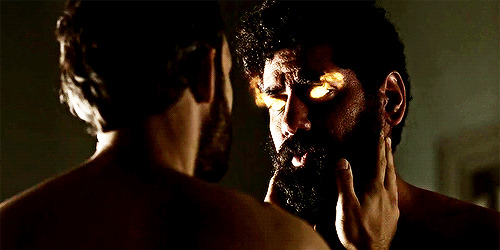
April Spink and Miriam Forcible from Coraline (couple.)
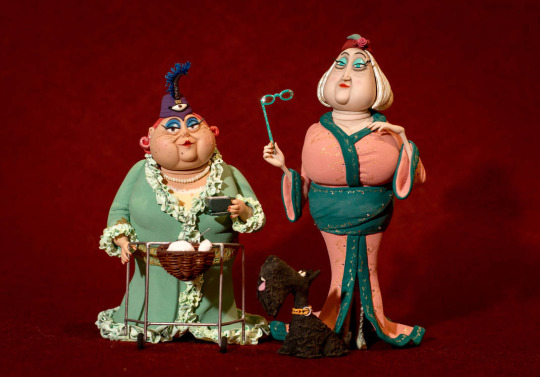
Angela (Lesbian).
The character Neil Gaiman created for Spawn is Angela. Angela is now owned by Marvel. Angela is a lesbian in a loving relationship with a transwoman named Sera.
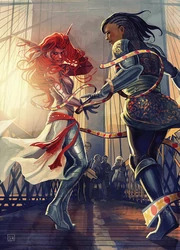
Salim and The Jinn from American Gods (Couple).
This relationship got nominated for a GLAAD award.
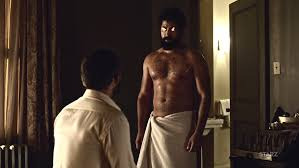
Sam Black Crow in American Gods (Bisexual)
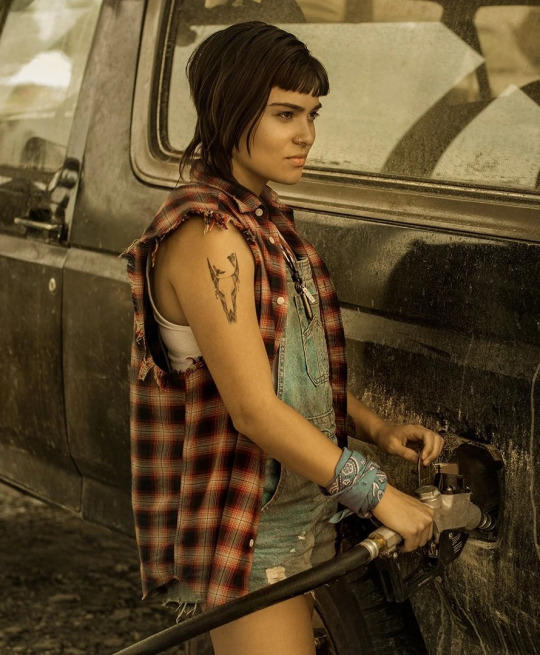
Snow White (Lesbian) Snow White (Yes, the fairy tale character) is the lesbian protagonist of The Sleeper and the Spindle, which is a sort of crossover fanfiction of Snow White and Sleeping Beauty that Neil Gaiman wrote as a short story.
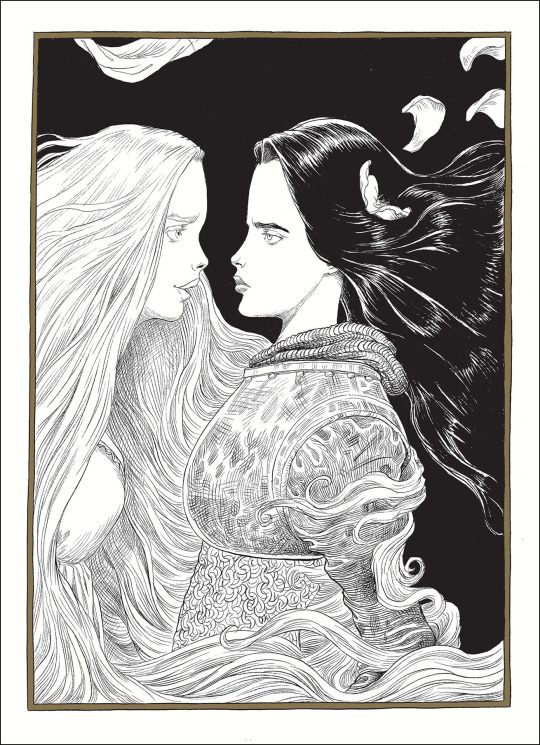
Captain Shakespeare in the film adaptation of Neil Gaiman’s Stardust (Gender nonconforming.)
His sexual preference is ambiguous but he loves feminine, soft, and pink things including womens clothing, hairdressing, and theatre. He also leads a band of cutthroat pirates who follow him loyally so there is that.
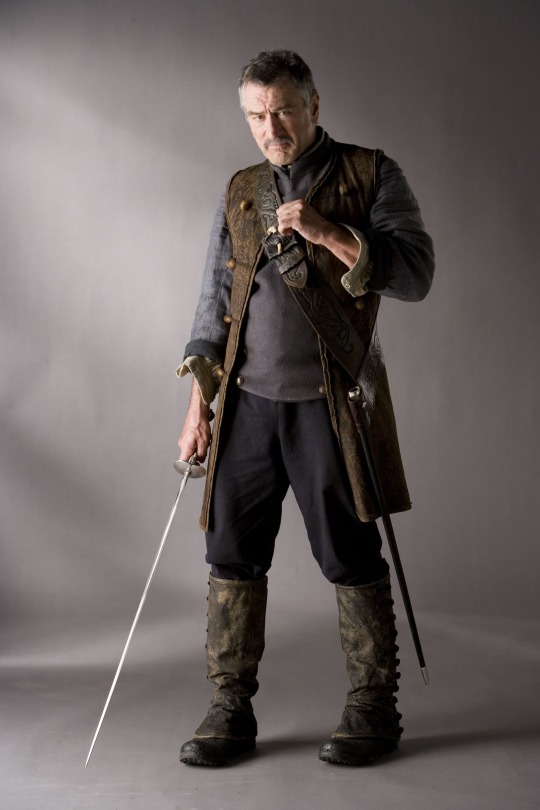
Loki (Loki)
There’s Loki in Neil’s book on Norse Mythology. Loki also appears in American Gods and The Sandman.
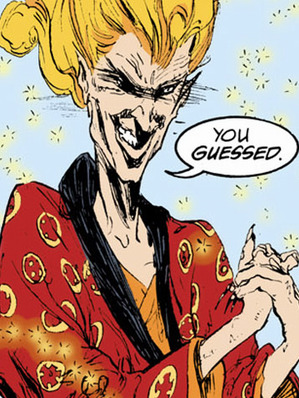
There’s also quite a few LGBT+ characters in Neil Gaiman’s Sandman, which include (but are not necessarily limited to):
Paul and Alexander Burgess (male couple).
It should be noted that Alexander and Paul were clearly in an open relationship (Polyamorous?) in the 1960s (With Alexander Burgess likely being panasexual) and they are now exclusive to each other by the end of Sandman: The Wake.
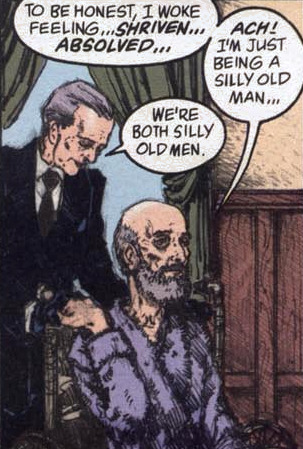
Judy (lesbian).
Judy was, unfortunately, phyiscally violent with Donna and it cost her the relationship. Judy died along with several other character at a diner when John Dee (Doctor Destiny) got a hold of Morpheus’ dream stone.
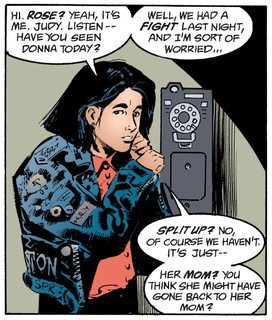
Donna AKA Foxglove (lesbian).
Donna is Judy’s ex-girlfriend but she ultimately found happiness with Hazel.
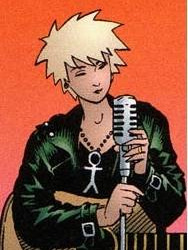
Hazel (lesbian).
Hazel had a one night stand with a man that resulted in pregnancy. She did not really enjoy it and now she and Donna (Foxglove) raise the baby together after having overcome many relationship issues. The baby was named after Wanda (the transwoman character). Since the baby was a boy they named him with Wanda’s deadname to remember her (Personally I think Wanda should have just been his middle name. Wanda hated the name Alvin). It should be noted that Donna and Hazel’s love story (which starts in Sandman: A Game of you) got a spin-off comic called Death: The Time of your Life and that comic won a GLAAD award for representation in the mid-90s.
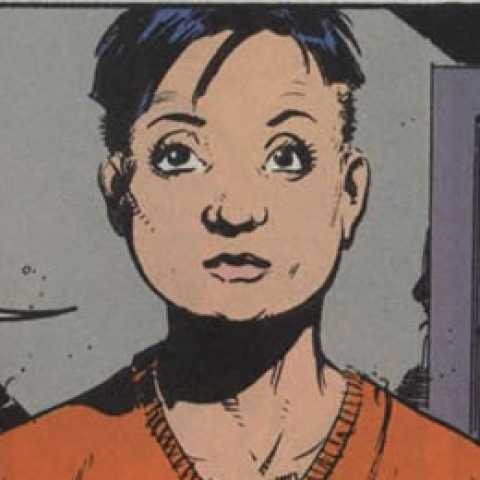
Cluracan (Bisexual. Possibly panasexual by modern standards.),
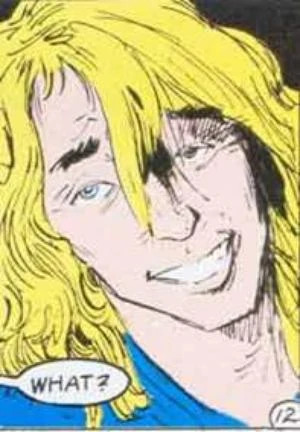
Wanda (Transwoman).
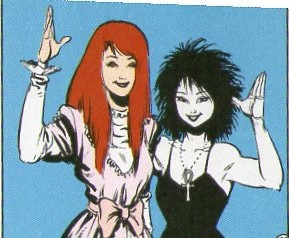
Desire (Genderfluid and panasexual). Desire is the living embodiment of desires, good and bad desires. One moment they might want your death, the next they’re helping save the universe. Desire can be male, female, both, or neither at will.
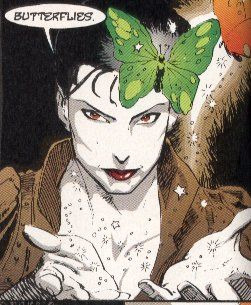
The Corinthian (gay),
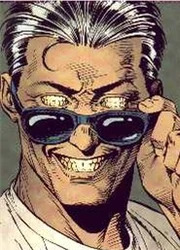
John Constantine (Bisexual.) Though not originally created by Neil Gaiman he was written by Neil Gaiman in a few stories. Including his appearance in Sandman.
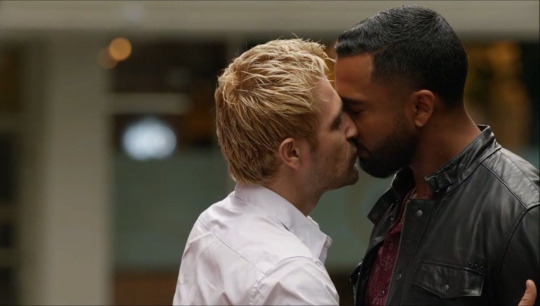
Lucifer Morningstar. (Complicated.) Lucifer Morningstar (like all of Neil Gaiman’s angels) is depicted as having no true biological gender in both The Sandman comics and in Lucifer’s own solo comics. Lucifer presents as male and uses male pronouns. He self-identifies as male but many other angels don’t really consider themselves as male or female despite how they present themselves.
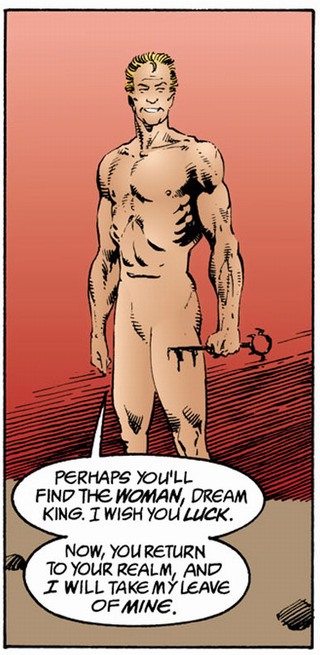
In the TV adaptation of Lucifer he is portrayed as having male and female lovers. It should also be noted that in the comics Lucifer was physically modeled after biseuxal rock star, David Bowie.
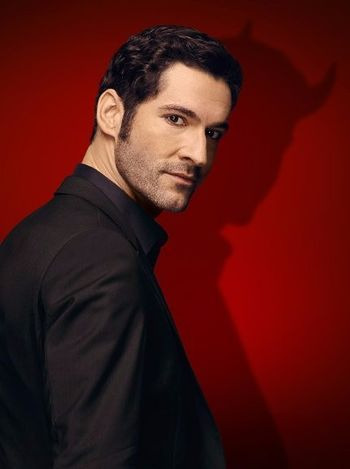
Mazikeen (Female identifying. Bisexual) Mazikeen is a female-identifying demon portrayed as bisexual in both the TV show Lucifer and in Lucifer’s spin-off comics. In Neil Gaiman’s The Sandman she was Lucifer’s lover.

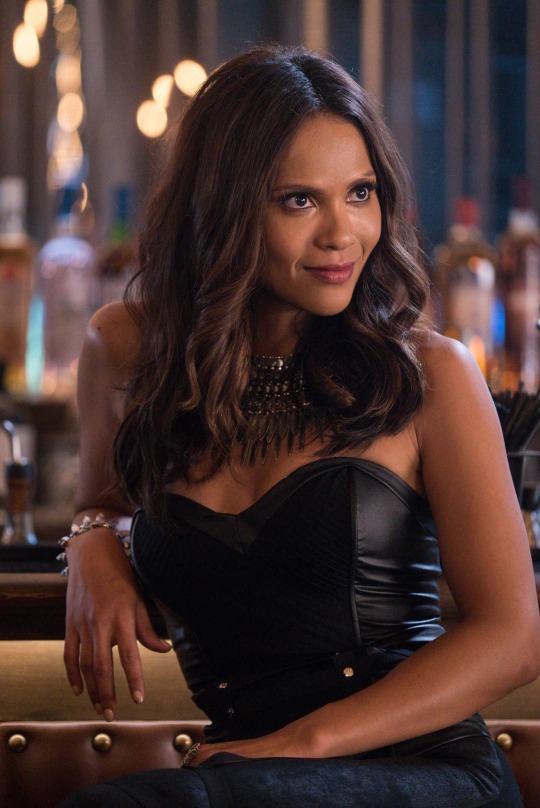
Eve (Bisexual)
Eve appeared in Neil Gaiman’s Sandman and in Lucifer as well as American Gods. In the Lucifer TV series she is portrayed as bisexual.
Note: Eve can change her age and appearance at will. Sometimes she’s young, sometimes she’s old. Sometimes she’s middle aged. And though she’s often appeared as white (such as in Sandman), she is black in the newer Sandman Universe comics, and in Good Omens.
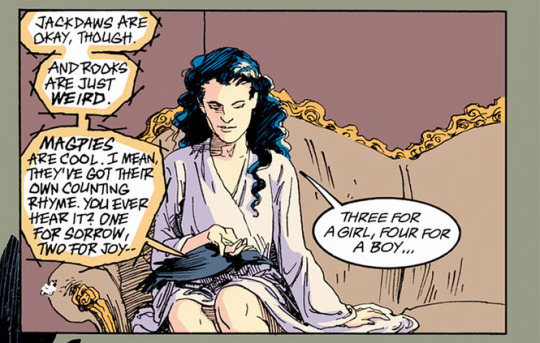
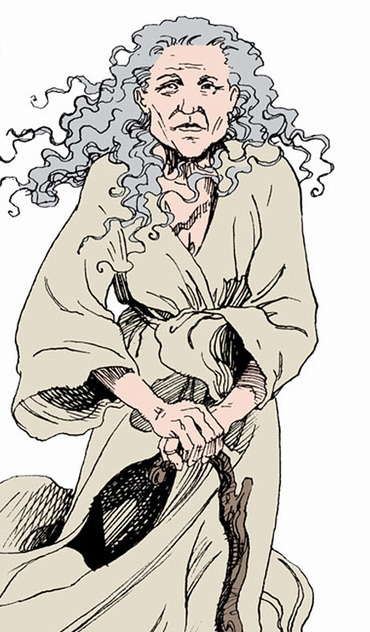
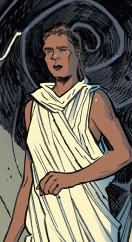
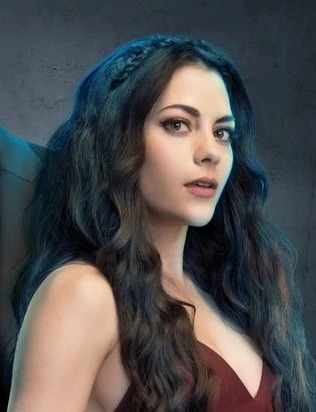
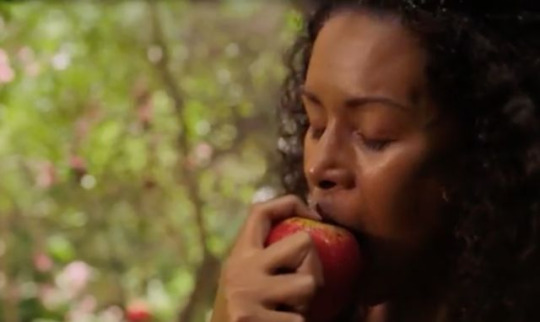
Various angels. (Diverse)
This one is a little complex. Many of Neil Gaiman depictions of Angels do not actually identify as male or female though many of them present as male.
Anatomically they are without gender unless they will it to be otherwise. Many of them have taken male and female Earthly lovers. You can see Lucifer depicted without physical gender in Neil Gaiman’s The Sandman, and other angels depicted similarly in the Lucifer solo comics that spin-off from Sandman.
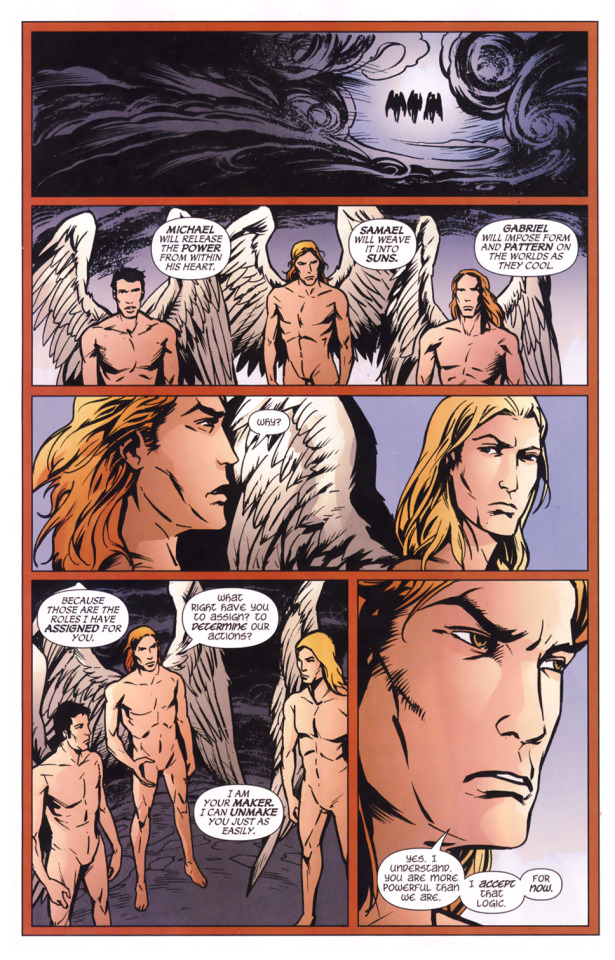
Pollution from Good Omens (Non-Binary)
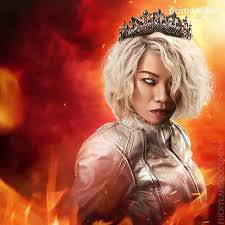
Aziraphale and Crowley in Good Omens (Couple. Demi panromantic celestial?)
Neil Gaiman does not personally view Aziraphale and Crowley in Good Omens as gay because they only present as male but aren’t truly male or female by nature. He has also said he does not view a male and female presenting angel couple as straight either for the same reason. He has said “I never said they are not queer.” just that he wouldn’t use the word gay for them.
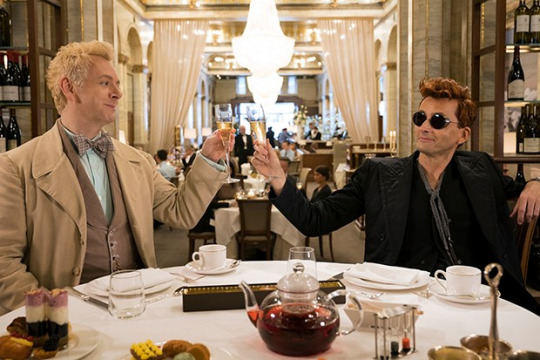
I know that’s not all of them but there you go. A list of LGBT+ characters created by Neil Gaiman.
And before I get a stupid hate-DM about how Wanda is “transmisogynist” because you read a Mary Sue article by someone who doesn’t understand context, understand this. There was no Trans representation when Wanda was created. She can’t follow a stereotype. The stereotype didn’t exist yet. She had not medically transitioned and ask yourself if you find her problematic just because she isn’t the conventional idea of feminine in her bone structure and height (Something even cis women have to struggle with). Yes, Wanda died but it was to show the cishet readers of 1992 that her soul was always that of a woman. There are still people today (even some Trans people) who don’t think you really count unless you fully medically transition. Wanda was scared of surgery but that shouldn’t matter. She was always a woman and that was the point Neil was trying to make.
Yes, Wanda’s family was transphobic. They were supposed to be seen as transphobic. Also Thessaly AKA Larissa and George are NOT supposed to be seen as good people. They are supposed to be seen as Transphobic. Thessaly is a pretty horrible person in The Sandman comics. She’s selfish and kind of homicidal. She represents the cold, self-absorbed immortal Morpheus used to be like. And before you try to argue “Just because Transphobia is real doesn’t mean Neil has to depict it!” (and yes, I’ve been given that argument while defending Neil Gaiman) ... Before you argue that, I want you to know something.
A Transman friend of mine was deeply moved by Wanda’s story because he went through similar. His parents still deadname him and misgender him on birthday and holiday cards and gifts. They never disowned him but they want to pressure him to “realize” he’s a woman. When he saw that Wanda went through similar, especially at her own funeral, he no longer felt so alone. Wanda may well have saved his life. So yes, I will defend that “problematic” character who died nobility and who was used in the early 90s to teach cishet readers that Transwoman (medically transitioned or not) are still women. Also, Neil is NOT accountable for how the story was drawn. He’s not the illustrator. So stop using the artwork to claim he’s homophobic. A comic book writer essentially writes a script and then it is up to the illustrator to draw it as best they can. By the way, the illustrator of Sandman: A Game of You (Where Wanda came from) was Colleen Doran, who was nominated for a Gaytastic Spectrum award in 2001.
Stop looking for reasons to hate one of the only men who has been trying to give the LGBT+ community representation since the 1980s.
#Neil Gaiman#LGBT+ characters#Gay characters#Gay representation#The Sandman#Lucifer Morningstar#Good Omens#American Gods
1K notes
·
View notes
Text
Haunting of Bly Manor
Right.
I love horror and after spending sometimes days watching video essays on gay history, specifically in (horror) movies and film, I now kinda understand why so with the Haunting series and its gay rep and them not being the villain of the story, I loved it.
(Quick note I have only rewatched the show twice and can only take from my own experience of media)
My phone also knows me so will suggest news stories on things I've recently watched or current murder cases. So it suggested me this story today:

I went in open minded knowing that some people were angry about the ending falling into the 'kill the gays' trope (which I will come back to).
At first it was fine, talking about the ghost story/love story comment and how it relates to the show and has good analysis that I agree with. Then it goes on to basically summarise the show.
It keeps mentioning that all the gay subtext is implied:
why Dani broke up with her fiance
why Jaimie is reluctant to be vulnerable with Dani (before the monologue)
And that there needs to be a “lot of filling in between the lines” to understand their romance despite their practically constant flirting (Jaimie's 'Poppins' for Dani is the cutest nickname) and multiple kissing scenes. However, I digress, it can be sometimes hard to understand certain attitudes to each other at the beginning.
It also states that its like they want on the pat on the back for "making them queer, without making anything about them very queer". I don't know what this means, but I took two interpretations:
That not all queer people need to stereotypically look queer to be and that is a step forward for gay rep (I prefer)
That the creator wants to be celebrated for making gay rep without truely showing their queerness (which I think is pretty false)
Then it talks about the fireside chat and Jaimie's backstory, describing the monologue as "shoehorned" into the scene and "devoid of any mention of her sexuality". This is where the first part of my 10 minute research for context comes in. This is set in 1987 in a small town in England with an American. In charge of England at the time was the famously homophobic Prime Minister Margaret Thatcher that implemented Clause 28. No one in this setting and right mind - especially after being ridiculed for most of her life - would come out to any one, flirting or not, that they have known for at most a month or two. Also, this entire scene resolves around Jaimie's attitudes towards people, and why she's reluctant to get close to people, favouring taking care of her flowers over interacting with others.
Then it talks about Owen and Mrs. Grose having "more meaningful screen time and backstories that continue throughout multiple episodes".
First Hannah. We basically get Hannah's entire backstory in episode 5: how she met Owen, scenes of her working at the Manor (in non-chronological order) and how she died in the first episode. Then that continued into the final episode when she finally comes to terms with her death and her love for Owen to save everyone. We don't actually get much backstory in the way of her childhood or even how she met the family (from what I remember, correct me if I'm wrong).
Now Owen. His backstory is that he grew up in Bly, left to go to France and became a Sous Chef, only coming back because his mum got diagnosed with dementia and he needed to take care of her despite her constantly mistaking him for other people. That is also only explored through Hannah's memories of the interview and the bonfire-side chat.
Those are both sad backstories but you can't call them any more or less meaningful than Jaimie's of in depth about how her and her family were ridiculed and bullied throughout her life and even spent time in juvie. They all have points mentioned in their stories that I would love more indepth on: how Hannah met the family/met Sam, either Owen's childhood in Bly or his time in France and why Jaimie spent time in juvie. But I also realise this is a short series that has to make fleshed out characters and tell an entire story in 8 episodes.
The article then talks about how even the ghosts got an entire episode to themselves when they barely show up. If you look in the background of the majority of scenes you'll see them and personally I really enjoy getting their stories of how they died. However, that episode is about more than just finding out about the ghosts and Viola's life, it’s mainly about what led to her being the first ghost and causing other dead people to stay as ghosts and the origin of those specific words that give a ghost access to an alive person’s body, to help explain the majority of the show. If I showed my friend this show and removed that episode I would have more questions asked than when my mum finished it.
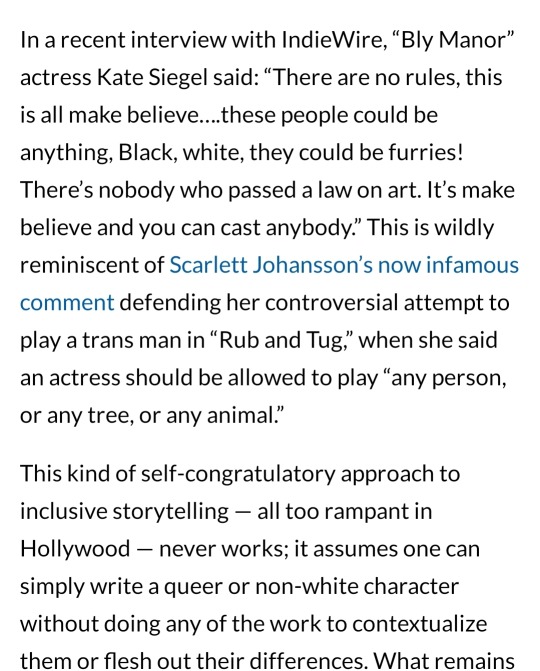
Now I don’t know what to say. I agree there is no law on art so it can be anything and I usually think that the haunting series are in a slightly different universe (it’s how sleep at night knowing that someone can’t be so stubborn they become a murdering ghost) but also yes, trans-roles should be given to trans people more often. However they are actors and their job is to play some they aren’t for entertainment so for the most part I agree with Scarlett about being able to play anything. Also yes the self-congratulatory approach after playing an LGBT+ character when you’re cishet is kinda bad unless you have the full support of the community telling you it was a good portrayal and accurate representation. It won’t be enough for minorities if our representation, that people outside the communities are calling great, are just surface level characters that are just there for tokenism but you can’t compare Bly Manor characters to those types of characters. All of them have so much development and are well done that the majority of the community that has watched the show have no problem with and love their representation.
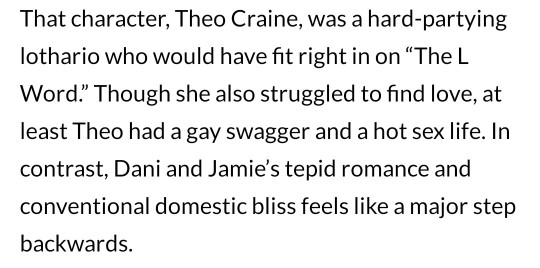
Personally I love both Theo Crain and Jaimie and Dani because they represent different things. Theo Crain is on a basic level. as a lothario, a stereotypical butch lesbian, constantly hooking up and struggles to actually open up and love people. Dani and Jaimie are soft, domestic cottage core lesbians in a flower shop AU. This is not a bad thing and just because they have a “tepid romance” doesn’t mean it’s a step back. Also more context time:
As said before Thatcher was in charge and heavily homophobic, creating laws to stop people from teaching children about homosexuality since gay sex had been decriminalised recently
It was the middle of the AIDs epidemic. Dani was coming from a country that was doing nothing about the deaths of thousands and going to a country where hysteria about AIDs was rampant but they were doing more, like the ‘AIDs: don’t die of ignorance’ information leaflet despite it not being as huge with 46 deaths by 1984. (That assumes that the AIDs epidemic happened in this universe)
Dani clearly had some form of internalized homophobia before even coming to England because she spent so long with her fiance hoping to feel the way she’s supposed to (I think the ghost of him is her guilt and internalized issues personified as it constantly appears when she’s trying to move forward.)
Also in the final episode it shows that is probably at least some homophobia in America as they kiss in the shop then look outside and go to the back so no one can see. (This could be interpreted as seeing if anyone is planning on coming in so they can escape without having to stop early for customers but Jaimie had already changed the sign to closed.)
Now onto the ‘kill the gays’ trope. Yes this is a huge trope that is so damaging to the community that we’re constantly the ones killed off for views or when their tokenism is no longer important, that is fucked up! However this doesn’t mean that we should give every gay character plot armour, cause that’s also unrealistic, just to please the select few that will call it out as a damaging trope. There is huge difference between say, The 100 killing Lexa and Bly Manor killing Dani as one has plot relevance and brings the story to a close while the other enraged an entire generation so much they started a brand new convention to celebrate queer relationships/characters in media. It’s also not like she was the only one to die, it’s horror after all, Hannah, Rebecca and Peter, the parents and all those ghosts died or were already dead.
Like many of the comments on the article - If all you got from this show was it falls into kill the gays, you have completely missed the entire point of the show.
#bly manor netflix#haunting of bly manor#dani and jamie#just my thoughts#ramblings#this is a product of my frustration
7 notes
·
View notes
Text
This is too long for me to be comfortable to put out without a cut, but dear god, did I need to rant and ramble on this subject...
I always feel awkward when I want to complain about how video games portray and fandom reacts to queer men, because I feel like the conversation (at least here on Tumblr) gets focused on the female protagonists - you know, the Commander Shepard or Alexios/Kassandra debates and that sort. The things where there’s valid comments to make about how important these female protagonists are, especially in an industry that is deeply misogynistic, and, in the case of the Assassin’s Creed protagonists, keep being developed with an eye towards the female-only protagonists, only to have a male protagonist shoved alongside them, if not upstaging entirely (such as Jacob being the center of Syndicate’s marketing, or how Bayek was originally going to die and Aya be the central protagonist of Origins, or the creation of Alexios and probably male Eivor on the basis of “women protagonists don’t sell.”)...
BUT, when I want to talk about my perspective as a gay man, as wanting to play these games for that empowerment, get to enjoy these games for representing me as a gay man, because Shepard, Ryder, Alexios, etc. get to be played as such, that having these male characters who are able to be played as attracted to other men means something to me, and that leads me to not just play the male characters, but prefer them to the female characters, or even to talk about the subject of homophobia in both the games themselves and the fandoms surrounding them... I do feel like there’s this pressure to just effectively shut up and stay quiet and let the women have their empowerment, that the moment needs to be theirs, not mine, that “fandom” (meaning the monolithic entity that is ‘the fandom’ and not necessarily any singular individual who I’m referring to or anything) is pressuring for anyone who enjoys the male protagonists for whatever reason to be silent and let the women enjoy their win, even if there’s a win for underrepresented men in there as well, or even a need to address the problems of homophobia by not representing queer men. That in its way, it’s effectively saying that a win against the sexism against the industry is outweighing or more important than any win against the homophobia. (Or, since I brought up Shepard, racism, considering that Shepard, Ryder, any game with the character creator, can be different skin tones as well, but that’s outside my lane.)
Like, this isn’t a callout post or any kind of directed screed against anyone, just... I suppose it’s a cumulative effect, based on the fact that I remember what the internet in the corners I frequent was like when Odyssey dropped, focused very much (and understandably - let me be clear that I have no desire to step on anyone’s victory or enjoyment of these games here) on Kassandra, and it felt like the fact that I got to play a character I could portray as gay (don’t start me on the bloody DLC though...) was a victory celebration at a table set for one, while (to really stretch my metaphor) seeing this massive party happening across the dining room at the same time, and that (and again, I’m really straining my metaphor, I’m aware), if I wanted to join that party, they would not combine our celebrations, I would have to join in theirs, and, in my wanting to pay attention to my victory, getting laughed at for it. It’s one of those things that makes fandom feel a little alienating, because I don’t particularly have much of a place that feels like it’s a space for me to celebrate my victories, rare as they are, and on occasion, even end up with the impression that, so far as fandom at large cares, that victory I want to celebrate is somehow less important. That the importance of Alexios, playable as a gay man, meant less than Kassandra, period. And, with Valhalla and Cyberpunk’s release on the horizon, along with (maaaaaaybe?) a Mass Effect Trilogy remaster, I find myself bracing myself for this to start up all over again.
And I know some of this is based in the fact that Tumblr and the transformative elements of fandom in general are more of a space that is dominated by women in fandom, who are going to celebrate the wins for them. That’s just how things shake out, I understand that it’s as much the place I’m going for involvement and interaction with fandom at large as it is anything else. Just... I obviously don’t fit in to the areas of “straight male” fandom, and then getting to the places in the “marginalized” segments of the fandom, it still feels like I need to find my way over to the margins of the margins to feel like I have a place in fandom more generally.
Like, I understand that I have male privilege and that is a factor in things - the male characters are probably more likely to be the ones in the marketing, so I get to see that idealized image of myself individually all over the covers and posters and trailers. BUT that doesn’t remove the straight privilege of the people who are shutting down conversations about the importance of the male PCs being portrayed in M/M relationships, even starts going into the realm of casual homophobia - because no acknowledgement of how important it is for the portrayal of gay men, or bi men, IS homophobic. I mean, how often do these companies have their official accounts post images of the M/M pairings? I’ve seen BioWare account retweet FemShep/Garrus and FemShep/Kaidan things, on top of the MaleShep/Female LI pairings. I’ve even seen FemShep/Liara content, which... We could go into the way that F/F pairings get fetishized and tend to be there as either fodder for cishet male titillation or just because the female PC gets swapped in for the male PC (in the way of Peebee riding a non-existent dick in the FemRyder romance scene in Mass Effect Andromeda), I don’t mean to discount that being a thing, so queer women are getting a short stick too. But where’s the M/M relationships? Hell, remember the whole #MakeJaalBi thing? After we got that notice about the patch for his romance would come... Has any official Mass Effect account actually SHOWN content of BroRyder and Jaal?
I mean, remember the Citadel DLC? The appearances of Kaidan’s romance material included FemShep, and Cortez’s content included a split second shot of just him and Shepard holding hands, and since it was blink and you’ll miss it, that means that it doesn’t even make any effort to portray the M/M relationships. And since I brought up Jaal already, BioWare had to be publicly shamed into offering M/M relationships in equal amounts to the other pairings in Mass Effect Andromeda. Like, it’s bad that Peebee’s romance for FemRyder just had the model swapped in for BroRyder, sure. But at least that content was THERE, at release. For gay/bi men who wanted to romance male characters, we have to make sure that we get that patch downloaded (meaning if you play the game without an internet connection, you can’t get access to his romance) - and only because the outrage actually GOT a response, which is not necessarily the norm in this industry.
Hell, the disparity there actually GOT noticed - if you include Scout Harding as a romance, M/M romances are the lowest numerical romances in Dragon Age Inquisition as well, with only Dorian and Bull as options. And I didn’t even realize this until this past year, despite being disappointed in those two options. Even recognizing that Harding is more of a fling than a full romance, it’s still more than M/M romances had. The closest we got was being able to flirt with Cullen twice before he shuts it down (and the rants I’ve had on THAT subject...).
And that’s just the focus with BioWare - I saw it all through the initial release of Odyssey, while I know that the official metrics are all saying that Alexios saw more play than Kassandra, Kassandra got a lot of positive response in the fandom that was often framed in opposition to Alexios, that she was the “better” protagonist.
Like, I’m bolding this for emphasis, and so if anyone is TL;DRing this it’s eye-catching enough: My issue is the dismissal and denigration of the male PCs when building up the female PCs. It is not being against celebrating the female PCs. It’s just the way that people will, in their positivity towards a female PC, dismiss the audience who relates to and connects with the male PC. The way that I’ve seen since day one the common “joke” that male Shepard is unnecessary, condemning the voice acting, even asking why he’s there when female Shepard is “the real Shepard”.
It makes fandom a hostile place to be when you’re looking to that character as your representation, your inspiration. Yeah, it’s a joke, but when it is coming from all corners, or at least feels like it, all the time, the humor dies, and you’re left with just the words. The words telling you that this mirror for yourself is something that people don’t care about.
Again, it’s that feeling of already being on the margins and then being pushed further. You are the freak among the freaks.
But it feels like saying any of this, like I have, is opening the door to be dismissed as being sexist, or misogynistic, or lesbophobic, or anything like that, because people want to boil down what I’m saying to no more than “but what about MEN? Why aren’t you talking about MEN?” in that dismissive way that so many MRA trolls attempt to derail the conversation - except, no, I am TRYING to have a genuine conversation, about men who aren’t represented, men who need these male characters as much as women need the female ones - queer men get the short stick in a lot of cases, like this goes back to the representational matters in a lot of kids TV shows - while we can absolutely talk about the bad representation it was broadly, I remember when Voltron concluded, having Shiro, having arguably the lead male character of the show, end the show marrying and kissing another man... That was heavily ignored by Tumblr. Meanwhile Tumblr EXPLODED for Korra and Asami or Bubblegum and Marceline.
It’s seeing what is representation for me as a queer man being played down or ignored while the queer women are praised. And, again, I’m not trying to take anything away from queer women, or women in general, but... Where, exactly, am I supposed to look for that same empowerment? And, more importantly, when the same media offers the empowerment for both groups, like video games do, why does it seem almost expected that I as a queer man back off and allow this to just be for the women in general, when the whole point of a variable protagonist is that it allows that empowerment for EVERYONE?
I mean, I say it feels like “opening the door” to these comments because it has happened before, and likely will again. Because saying “this joke feels hostile to me, as a member of an underrepresented group, can we please not?” or speaking about my individual experiences and feelings - often even just in my own space, on my blog, frequently only tagged with my individual tags for organization in my space, rather than publicly shouting it through a megaphone by putting it in public tags, and somehow STILL getting attacked for these comments - is apparently all those things... That’s been the response I’ve gotten to saying things like this in the past.
And, in case I haven’t been clear with the repeated comments and the bolded statement above, it’s not about me, a man, trying to take away this thing for women. Rather, it’s me, a queer person - and fine, yes, a queer man - who wants to celebrate being seen, wants to celebrate what is still not a common thing of seeing myself in my media, and then feeling like I’m being shoved out of the way because other people celebrating their representation is considered more important, to hell with me and my mirrors.
Like, I’m not saying any of this is anything actively conscious or even intentionally malicious. It does seem like a reflexive defensive position - “men have tried to take this from us, so we’re not letting ANY man through.” I don’t want to come across as flippant or not aware of the fact that this isn’t a walk in the park for women. I get it, I really do. I’m just... It does feel like my struggles are something that I’m being told to downplay in the name of allowing others to have their celebration.
Thing is, my own experiences as a queer person already leave me feeling like I’m getting that as well - I mentioned before (and have elsewhere) that Dragon Age Inquisition’s M/M romances didn’t work for me. But I have often felt like I need to downplay the fact that I don’t emotionally connect to Dorian as a character - in the immediate aftermath of the game’s release, you could not say ANYTHING negative about him without getting shouted down as either a homophobe or dealing with internalized homophobia. Meanwhile, I’m here, pointing out that, hey, the previous games did not really have any direct homophobia, and the little bits that did lean in that direction felt more like the writers living in a homophobic society and not able to wholly divorce that in their writing than anything in-universe. To me, Thedas was a place where being gay was a difference that made no difference. And then Inquisition tore away that escape from homophobia so bluntly.
So, Dorian doesn’t empower me, you ask, so what about Bull? Yeah, I identify with “queer man” because while I’m a man romantically attracted to other men, I’m also asexual - just regular vanilla sex is in the fringes of my comfort zone. Bondage is an outright catapult out of there. At mach three. So I’m left uncomfortable by both of my “options” in Inquisition. And the response I have always braced myself for when I bring this up, when I do add my voice to the conversation about the M/M options, is “well, they can’t please everyone, and this was good for some people, so you should be content with that.” Being told I can’t have everything, so feeling uncomfortable at best is just something I have to live with, because hey, THOSE OTHER PEOPLE got satisfied, and so you should just be happy for them.
It’s that pained metaphor I offered earlier - the victory celebration isn’t for me, I’m on the outside looking in EVEN STILL. I am the freak among freaks.
Where is my place to belong, in all of this? Because it’s honestly hard to find, when all the spaces deemed “for me” still feel like an exclusionary party?
7 notes
·
View notes
Text
Can a show be successful simply because it has a great queer storyline?
I’m always in search of realistic depictions of LGBTQ+ characters I can actually relate to. Don’t get me wrong, I’ve watched my fair share of Blue Is the Warmest Color, but like any other self-respecting lesbian, I want more.
In that sense, The Bisexual is a f*cking masterpiece. Inspired by the life of Desiree Akhavan (director of the show and its lead actress), the Hulu series follows Leila, a—you guessed it—secret bisexual, eager to explore the full range of her attraction. But unlike the typical bi narrative, The Bisexual flips the script: Leila has been living life as a lesbian, but when her long term partner Sadie proposes, she asks to take time apart from their relationship, partially to take her shot at dating men.
The Bisexual is a comedy-drama, and yet, it’s not really all that funny. Or dramatic. That is, unless you’re also a lesbian currently dating a man, which I am. In which case, it’s hilarious.
The lesbian-cum-bisexual experience is an incredibly niche perspective I ache to see on screen, and The Bisexual fills the role to a T. Layered and nuanced, the show captures the good, the bad, and the ugly consequences of coming out for a second time.
I—I mean, uh, Leila—gets flack from both her circle of lesbian friends and her straight roommate Gabe, nevermind from herself (internalized biphobia, anyone?). The label carries unrelenting stigma, in Leila’s own words, “I’m pretty sure bisexuality is a myth. Yeah, it was created by ad executives to sell flavored vodka.” As she comes to terms with her own sexuality, low-ball criticism is hurled her way from every direction: Gabe suggests she’s slept with half of London, presuming she has no standards and must be attracted to everybody; ex-wife Sadie accuses her of being a liar and a “pretend” lesbian; even Leila’s best friend confesses, “Nobody’s going to be honest with you, but it does change things.”
Leila finds herself in scenarios only a “lesbisexual” can understand. Her first hookup with a man is a complete disaster. When she admits she’s never done this before and doesn’t know what to do with her hands, he says he’d always dreamt of ~deflowering~ a lesbian but imagined it would be hotter. When a fling with another guy comes to an end, Leila desperately crawls back to Sadie seeking familiar validation (Because if one relationship with a man doesn’t work out, you must have really been a lesbian all along, right? Pick a side!).
It’s hilarious to watch Leila navigate her newfound life as a bisexual. As she alternates between spending time with the straights and her old gay friends, it’s clear there’s an immeasurable cultural divide. On one hand, she hangs with the familiar queer artist circle, making appearances at parties with strictly creative dress codes and obscure performance art. In the next scene, she’s at a straight club, her level of discomfort only comparable to the way a vanilla cishet might feel in a leather bar.
The show is peppered with references to queer culture, and despite being a bit on the nose, they’re amusing if you’re in the loop—My favorite being when Gabe joins Leila’s friends at a dyke bar, and when two of her friends are compared to Dana and Shane, she turns to him and says, “Just ‘cus one person made one L Word reference today doesn’t mean you get to go back to all your friends and say all lesbians do is talk about The L Word.”
Despite my obvious admiration, The Bisexual is by no means universally liked, earning only 3/5 stars on IMDB. Critics have called the show “a comedy-drama whose time has come,” “inconsistently amusing,” and “hit-or-miss,” criticizing its lack of hardhitting punchlines and expected comedy-drama antics.
And I get it. I don’t enjoy The Bisexual because it’s a show for everybody. I like it because, in essence, it’s both written about me and for me. This is a rare representation of a bisexual woman’s experience that I believe has value in the world, especially amidst a sea of tacky gay romance films. If you’re not also a bisexual lesbian, the show may not be cut from your own cloth, but nonetheless, it adds to the richness of our collective cultural fabric.
Criticism of The Bisexual must be unpacked: Does a show need to be palatable to all audiences in order to be good? Does every gay reference need to be footnoted for public consumption (*But I’m a Cheerleader (1999), 1:22)? Do queer people need to be understood by the mainstream in order to be accepted? Or can they simply just...be?
I argue in favor of content by and for queers. Straight people watching gay films might inevitably miss some of the jokes, but that doesn’t mean the show should be thrown out. After all, we’ve sat through decades of stories that weren’t meant for us.
So to all you IMDB haters, I say: So what if the series isn’t for you? It may not be the comedy of the century, sure, but The Bisexual is at the very least validating. And for me, that’s more than enough.
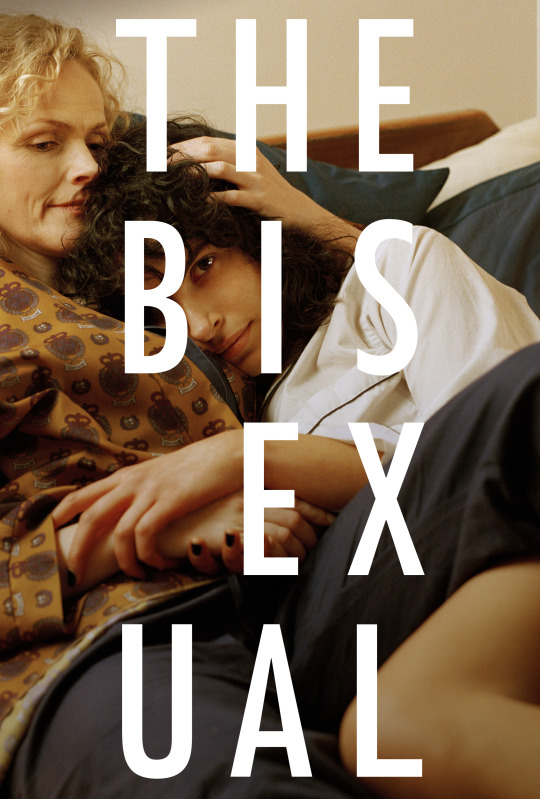
3 notes
·
View notes